- Skip to primary navigation
- Skip to main content
- Skip to primary sidebar

Destinations.ai
We make it easy to find the perfect travel destination

12 Best AI Travel Tools & Resources to Plan Your Trip
Author: Destinations.ai · Updated on: February 1, 2024
The world of AI solutions is making amazing new things possible in many industries. Emerging trends in the hospitality business are using AI applications to find the best deals to book flights, plan curated itineraries, and navigate to their destinations — all in a convenient self-service portal. In this article, we compared online reviews from hundreds of users to find artificial intelligence travel tools for your next travel and tourism.
Best AI Travel Tools & Resources
1. best artificial intelligence travel tool overall — destinations.ai.
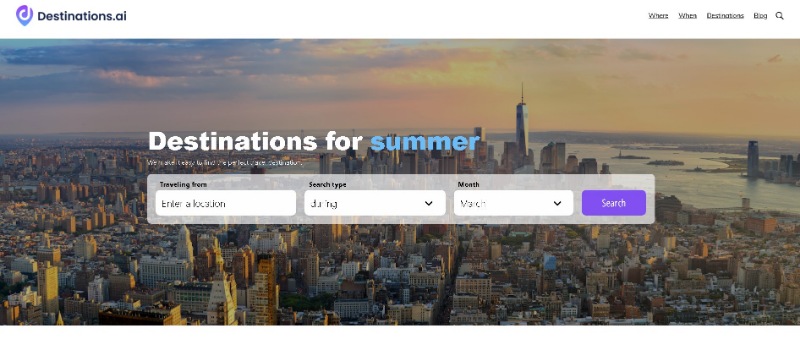
Destinations.ai is made to be your all-in-one artificial travel assistant in a way that traditional travel companies can’t match. Regarding the travel industry, this is the artificial intelligence you want at your disposal. It isn’t just a travel assistant — it is a total vacation planner that uses customer preferences and data analysis to generate an AI-designed holiday trip.
You put in your preferences for travel dates, airlines, budget, temperature, scenery, and other travel planning needs, and Destinations.ai generates a custom-made vacation destination just for you. That includes hotel bookings, flight reservations, and tourist destinations in just a few moments.
Regarding personalized experiences and virtual assistants in the travel industry, there is nothing quite like Destinations.ai. This savvy artificial intelligence points to the future of the travel business, showing the endless possibilities of travel and AI. If you want to explore but aren’t sure where to start, Destinations.ai could be an excellent choice.
- No plan is needed; completely free
- It only takes a few moments to generate an itinerary
- Supplemental travel guides to learn more about a location
- A new tool, so it may have bugs that need to be fixed
- Few reviews yet available to compare
- I can plan trips only in the US at the moment
2. ViaTravelers Authentic AI Travel Planner

As travelers increasingly look for smarter ways to plan their trips, the ViaTravelers Travel Itinerary Generator emerges as a notable tool in AI-driven travel planning. This platform utilizes artificial intelligence to craft personalized itineraries, simplifying the travel planning process for its users. If you are GPT Plus member, they also have a custom GPT called ViaTravelers – Ultimate Travel Planner , so you plan your travel on the go.
The AI at ViaTravelers stands out for its ability to select flights and hotels , among other travel necessities, aligning with a traveler’s preferences and budget. Rather than sifting through myriad options on sites like Kayak or Expedia, this itinerary generator offers a more targeted approach:
- Preferences Tailoring : Users input what’s important for their trip, such as destinations, budget, and themes.
- AI Automation : The AI analyzes preferences against vast data to suggest the most suitable travel plans.
- Personalization : Each itinerary is uniquely generated, tapping into user-specific desires and needs.
ViaTravelers adopts an API similar to that of innovative travel planners, yet it emphasizes authenticity by drawing upon its travel experiences to inform suggestions. This positions the tool as a hybrid between a search engine and a personal travel advisor.
The service also acknowledges the role of AI trip planner tools in streamlining travel planning. By leveraging ChatGPT-like capabilities, it manages to curate personalized travel itineraries seamlessly. Despite these advanced features, ViaTravelers remains impartial, earning commissions on purchases or bookings made through the platform, as is common in the industry. This generator is part of the future of automated travel planning, combining user input with intelligent algorithms for an optimized travel planning experience.
3. Best Tool for Cheap Flight and Hotel Alerts — Mighty Travels
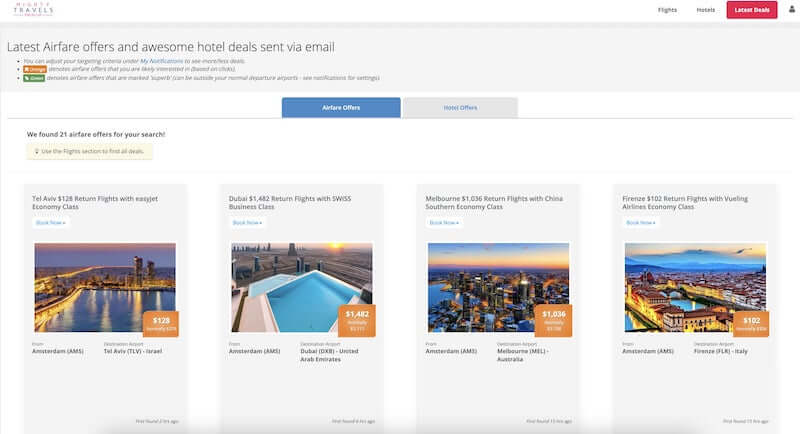
Mighty Travels Premium is a travel platform that provides travelers with a vast array of services designed to enhance the travel experience. It offers an interactive interface providing up-to-date information on flight deals, hotel discounts, and rewards programs.
Mighty Travels Premium can be an invaluable tool for frequent travelers looking to optimize their fare costs and mileage usage. Occasional travelers who prefer a more straightforward booking process may not utilize its full benefits.
- Comprehensive Information: It provides users with extensive flight data, including prices, destinations, airlines, and potential use of miles.
- Updated Deals: Regularly updated fare deals allow users to find the best price for their desired destination.
- Travel Using Miles: The platform indicates how users can leverage various loyalty program miles for their travels.
- Price Comparison: The tool compares the offered and average market prices for each itinerary.
- Global Destination Coverage: Mighty Travels Premium covers a wide range of destinations across the globe, including minor airports and less popular routes.
- Overwhelming Data: For new users or infrequent travelers, the volume of information might be overwhelming and hard to process.
- Premium Feature Accessibility: Some features are only accessible via a premium subscription, which may not be affordable for all users.
- No Direct Booking: You cannot directly book your tickets through the platform. It serves as a search engine redirecting you to third-party websites for actual booking.
- Limited Airline Representation: While it does provide options from various airlines, some low-cost carriers are underrepresented or absent in search results.
4. Best Artificial Intelligence Travel Tool For Groups — KAYAK
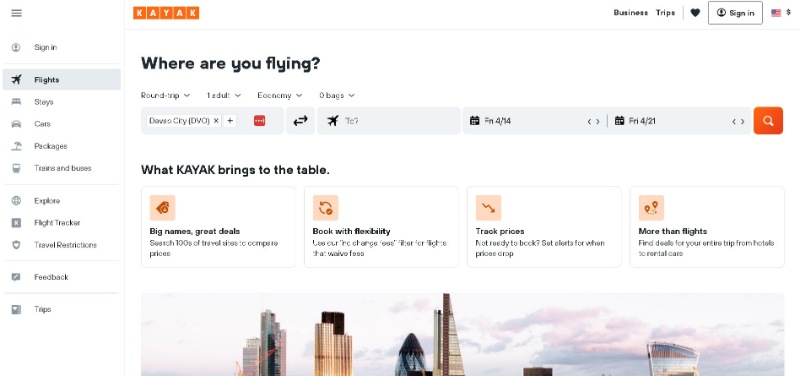
You may have heard of KAYAK as one of the top travel metasearch engines for hotel rooms, flights, and car rentals. However, this AI-driven site in the travel industry can also help curate the perfect itinerary for your next trip, all with the most basic information.
It also tracks the flights during your travel dates to help you find the best deals. Most notably, KAYAK’s itinerary function can be shared between users, making it ideal for planning a vacation with family members or a big group of friends. Customers can also approve flight alerts to get the best deals to book airlines and travel without breaking the bank!
KAYAK may still be primarily known as a standard booking company in the travel and tourism industry, but it has a bright future. If you are planning a group travel experience or want to share your travel plans with friends, this could be right up your alley.
Pros:
- The platform is easy to use and intuitive
- Multiuser sharing makes it easy to plan group trips
- Flight alerts offer the chance to get better deals on travel
- Some reviewers mention information such as travel dates or hotels being changed without their knowledge
- You will need to be cautious of scams, as scammers have found ways to work with KAYAK
See Related: Most Romantic Places in the World
5. Best Artificial Intelligence Travel Tool For Trips With Multiple Stops — Roamr
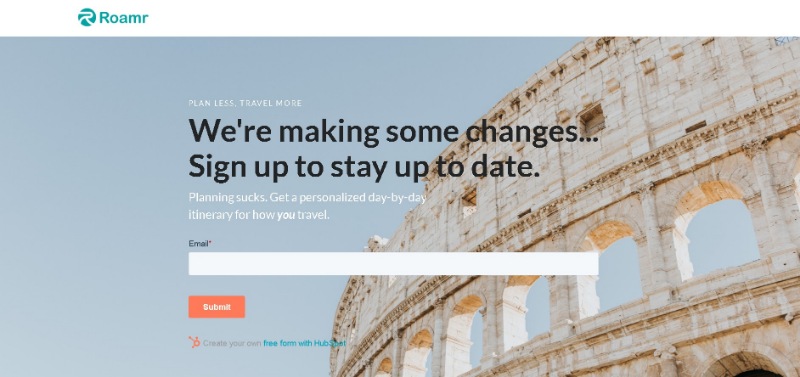
Roamr is a newer artificial intelligence tool that lets you complete a travel itinerary in mere seconds with a few basic details, including your budget, travel dates, and where you want to go.
But the most intriguing feature of Roamr is that it makes it possible to plan a trip between several cities in the same area in a way that most travel companies can’t. One example: want to explore both Munich and Prague in one weekend? Roamr will point you toward local train schedules and other info to help you make multiple stops on a single trip.
This is especially helpful in places such as Europe, where you can quickly jump between cities and even countries within a day. If you have a lot of quick stops on a more extended trip, Roamr could be the travel assistant you need.
- Making an itinerary is super-fast and only requires basic details
- It helps you plan both international and local travel
- Made to work with mobile devices
- Still in its early days, so there may be bugs to smooth out
- Not a lot of reviews online
6. Best Artificial Intelligence Travel Tool For Business Travel — Amgine

Imagine was designed as HelloGbye, an AI-powered platform with business travel in mind. This tool is intended for people who frequently travel in their line of work and have to deal with the regular hassle of booking flights and hotel rooms. What is more, Amgine isn’t purely AI — it works in a unique human-AI interface that helps the booking process and other travel-related methods go more smoothly and successfully.
Business people face unique challenges when booking travel, especially if their job centers on traveling. Imagine is a travel assistant that takes the stress and struggles out of traveling for work, making the process smoother in a way that is beyond human intelligence or the capacities of most tourism companies. If you travel for work regularly — especially if you often cross borders or fly across the world — Amgine could be just what you need when it comes to AI in travel.
- Designed with businesspeople in mind
- It uses a human-AI interface to help the process be smooth and automated but also relevant and helpful
- Not widely available — customers must request a demo on the website to use
7. Best Artificial Intelligence Travel Tool For Those on a Budget — Expedia
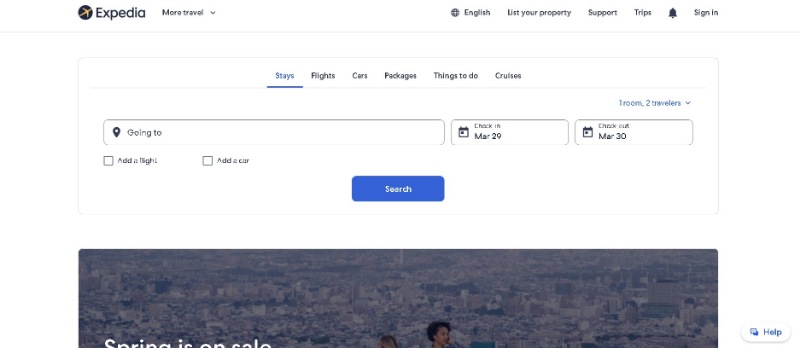
We have all heard of Expedia as a website for booking car rentals, hotel rooms, and other travel needs. However, the popular platform also uses AI to improve its customer experience. Customers start by narrowing their search based on location, budget, travel dates, and other preferences.
Through the artificial intelligence-powered website, Expedia helps you find the cheapest flights and most comfortable hotels with dynamic pricing services. One of the site’s biggest appeals is the helpfulness of the AI chatbot, which can respond promptly to people experiencing travel crises who need to rebook or cancel flights, car rentals, or hotel rooms. If you want to be able to change your travel plans and customize your vacation with a dynamic robot concierge, Expedia could be a perfect choice.
- It helps you find the best accommodation bookings suited to your needs
- The helpful chatbot is widely recognized for its machine-learning algorithms and excellent customer experience
- Travelers can change travel choices as needed, even in an emergency
- Some customers report being able to find better deals by reaching out to hotel owners or travel agents directly
- Cancellation policies may be strict
See Related: Best Spring Break Destinations in the US
8. Best Artificial Intelligence Travel Tool For Those Who Need Offline Access — TripIt
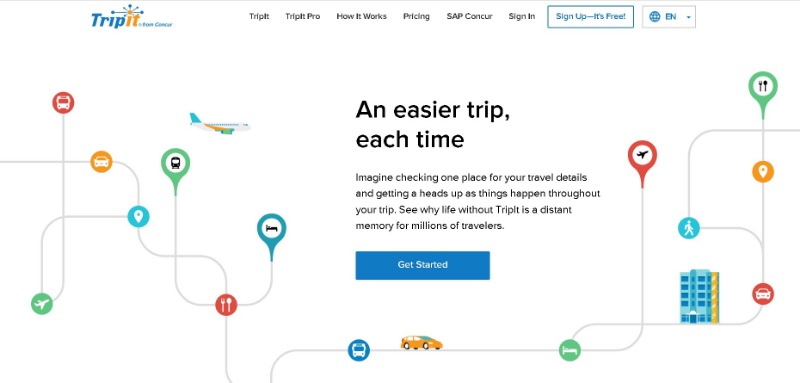
TripIt helps you organize your trip in one place by helping you plan ahead and keeping you abreast of minute-by-minute travel changes. These include everything related to trips, from gate changes to flight delays and other information.
The tools allow users to track their trip even while not connected to the internet, making it a valuable platform for those traveling to places that might not have consistent internet access. The Pro offerings will allow you to track live flight updates, fare adjustments, and other changing information.
- Pro TripIt allows travelers to track live updates regarding their bookings and itinerary.
- An all-in-one platform keeps you organized.
- All you have to do is make a booking and select “forward to TripIt” to have it added automatically to your itinerary
- Offline access to itineraries
- The free version does not offer access to all features, such as live flight updates
9. Best AI Tool For Those Whose Plans Change — iPlan
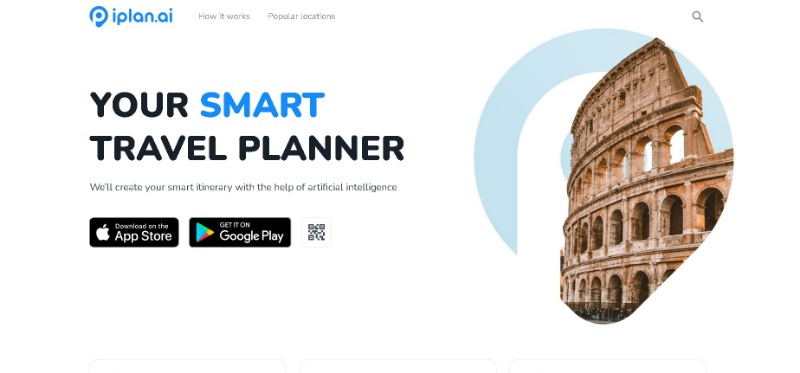
Are you the kind of person who prefers not to have a set-in-stone travel itinerary and instead see where your trip takes you? Many customers are! Users can still use AI in travel with a tool like iPlan . This platform adjusts your itinerary automatically as you update it, customizing it as much as you want.
Through some savvy machine learning, iPlan will rewrite your plans in moments. To make it even easier to coordinate while still being spontaneous, you can share the itinerary with other travelers, making it simple to travel with a group of friends or colleagues.
Every person with access can edit the plans, too. This handy tool proves that planning things doesn’t have to take the fun and spontaneity out of travel.
- Shared edit access makes it easy for group travelers to collaborate
- Problem-solving AI technology adjusts your itinerary as you edit elements
- Quick adjustments help travelers adapt in seconds
- Completely free to users
- Limited information and customer reviews online
10. Best AI Travel Tool For Exploring a City — Roam Around
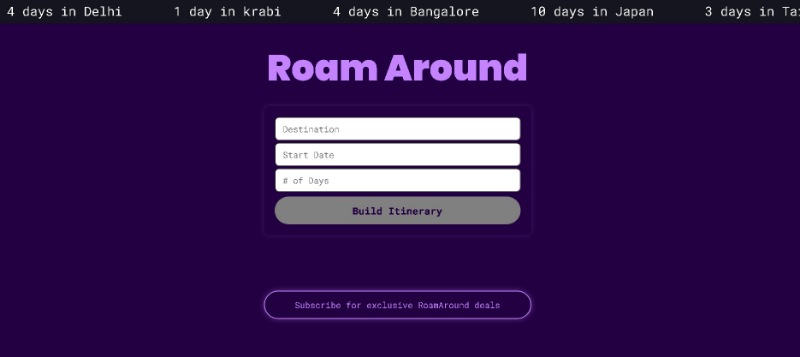
ChatGPT is undoubtedly one of the most well-known AI technologies of today. Roam Around works directly with the platform to assist you with basic travel planning needs.
Performing tasks requires only a small amount of basic information — your destination and the length of your time there. It then produces a tailored itinerary with suggestions for what you should do during your stay.
Roam Around is a pretty essential tool for AI in travel, but this could be helpful for those who don’t know how to formulate sophisticated questions for data processing. On the other hand, some people might find it lacking in terms of tools and filters.
- Offers basic information about tourist destinations to visit during your stay
- Works with ChatGPT, a widely-accessible AI tool
- Basic enough for almost anyone to use it
- It doesn’t allow you to filter or refine your queries
- It might not present enough information for many customers’ needs
- It does not track airlines, flight information, or hotel bookings
See Related: Best Beach Vacations in Europe
11. Best AI Travel Tool For Those Who Want a Unique Experience — Vacay
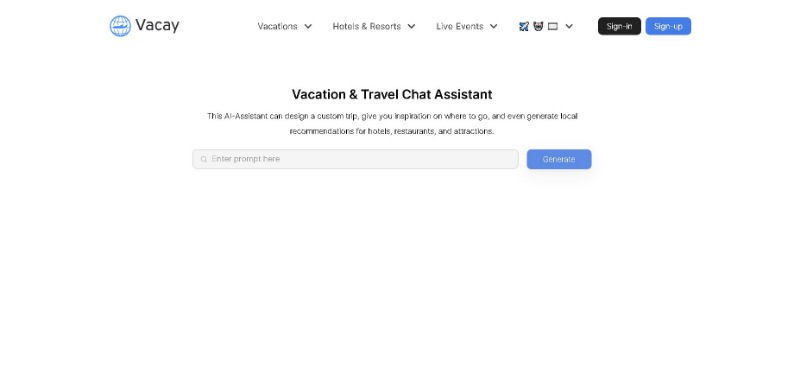
If you’re looking for something genuinely tailor-made for your travel needs and goals, Vacay is a perfect choice. This AI chatbot partners with ChatGPT to help you figure out the ideal vacation for your needs, including destinations, travel dates, things to do, and more.
This is an excellent option for those who want to take a trip but aren’t sure where to start. Vacay will even provide recommendations for local hotels, restaurants, and entertainment. This means that it has many uses, and consequently, you’ll have to know how to use AI chatbots to refine your search.
- Helps design customized vacation itinerary
- Available with suggestions for local hotspots
- Not well-suited for those who don’t know how to write AI prompts
- The itinerary must be copy-pasted to notepad, as details aren’t saved
12. Best AI Travel Tool For Non-English Speakers — Skyscanner
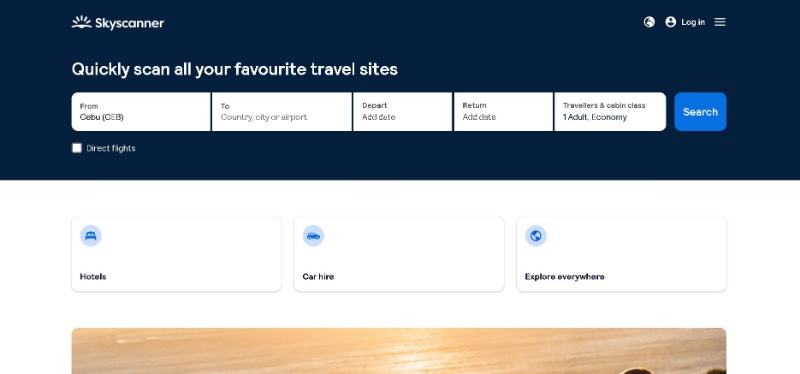
All these travel tools are great, but you might be out of luck if English isn’t your preferred language. If your travel planning happens in another language, you might have an easier time with an AI assistant like Skyscanner . This Edinburgh-based AI tool offers the chance to make an all-in-one travel plan in one of 30 languages.
To make it even more accessible, you can connect to the AI chatbot through social media, including Facebook messenger and WhatsApp . Start by searching with even the barest details — you don’t have to have a destination if you’re unsure where you want to go. To start, you must type “Anywhere,” and you’ll be directed toward the cheapest flights during your travel period.
- Available in 30 languages
- Accessible through social media platforms
- You can get as detailed or barebones as you like
- Not operated on a single platform (you’ll be directed to the website to finish your travel booking)
Related Resources
- Best Destinations in the World
- How to Find the Perfect Travel Destination
- How to Use a Vacation Generator to Find a Destination
Related Posts
- Can You Bring Cigarettes On A Plane? TSA Rules and Restrictions
- Can You Bring Food Into Disney World? What to Know Before Packing Snacks
- Naples vs Florence: Which Italian City Should You Visit?
- The Problems with LAX: Why It’s Considered Bad and How to Improve It
- Do Disposable Cameras Get Ruined in Airport Security? Tips for Travel Photography
- Can You Check a Duffel Bag at the Airport? Know the Rules and Restrictions
AI in Travel: 14 Examples to Know

The need for AI in travel has grown more urgent as travelers’ expectations have risen. Almost half of Americans rate their air travel experience as average or below average, so companies have turned to artificial intelligence to smooth out some of the turbulence.
AI in Travel
AI travel technologies are driving quicker customer service, personalized recommendations, flight forecasting and other advancements. Chatbots and AI travel planners can answer questions, share info about hotels and destinations and perform other tasks to create individualized travel experiences.
AI for travel comes in many forms. For example, it can respond to customer questions and queries with chatbots and digital assistants ; offer personalized travel recommendations based on someone’s previous search history; analyze customer reviews and social media posts; and track bags, flight forecasts and other variables.
As a result, organizations can pinpoint inefficiencies, learn from customer data and adjust their workflows and products. The outcome of these efforts is a more tailored and seamless travel experience for customers.
Below are travel companies embracing artificial intelligence and finding effective ways to introduce AI in the travel industry.
AI in Travel Examples

How it uses AI in travel: Smartly offers an AI-powered advertising platform that supports ad campaigns for brands in a variety of industries, including travel. Its solutions range from AI-generated backgrounds for digital ads to automated campaign management. Travel businesses that use Smartly’s technology have seen their conversion rates multiply and were able to reduce their manual workload for creative production.

How it uses AI in travel: IDeaS builds software and systems to streamline revenue management for travel and hospitality businesses. Its solutions are infused with AI capabilities, powering automations that cut down on manual tasks to enhance productivity and actionable insights to inform profitable decisions. Ideas’ technology supports thousands of hotels and resorts across more than 150 countries.

How it uses AI in travel: Concierge by Ava, part of Navan ’s all-in-one travel tech platform, addresses the challenge of personalization in travel bookings. With multi-tasking, generative AI capabilities, Ava learns travelers’ patterns and preferences to streamline the booking process. Integrated directly into the web application, Ava goes beyond traditional AI tools by also automating search fields in the Navan app.

How it uses AI in travel: Sojern ’s tech solutions for its travel and hospital industry clients include an AI Smart Concierge to engage guests and improve their overall experience. It’s equipped with more than 1,000 responses to guest questions, giving the virtual concierge the ability to handle tasks such as having items sent up to a hotel room as requested or scheduling spa services.

Sabre Corporation
How it uses AI in travel: Sabre delivers AI and machine learning solutions to travel companies in the form of Sabre Travel AI . This product suite enables airlines and other travel parties to access real-time customer insights, send relevant offers to customers, reduce costs through automation and ultimately generate more revenue. Sabre Travel AI also works with Sabre’s products for market and retail intelligence, so companies can survey larger industry trends and make informed business decisions.

How it uses AI in travel: IHG is a global hospitality company that oversees 16 brands and is updating its offerings with an AI-controlled bedroom . Through its partnership with Josh.ai, IHG is implementing AI that understands voice commands via natural language processing . This way, customers can make a simple request to play music, stream a show and take other measures to make themselves comfortable during their stay.

How it uses AI in travel: Hyatt is a global hotel chain that is upgrading its services by combining AI and travel in the form of an AI-powered bed . The Bryte Restorative Sleep bed relies on sensors to track a patient’s heart rate and breathing, adjusting the temperature and firmness of the bed to help sleepers enjoy a deeper doze. Customers can even set pre-programmed movements, so the bed nudges them awake in the morning.

How it uses AI in travel: FLYR keeps airlines one step ahead of market trends with its revenue operating system. Known as Cirrus, the company’s platform compiles data from airlines and relies on AI algorithms to analyze the data and produce accurate forecasts on sales, booking activities and other travel factors. Travel companies can then anticipate loading levels of certain flights and determine prices that account for the rise and fall in demand.

Tripadvisor
How it uses AI in travel: TripAdvisor is known for guiding travelers with tips and insights ahead of their journey, but the company has made waves for its AI virtual voice tour to revamp tourism activity in Orlando and Abu Dhabi . Designed for virtual assistants like Amazon Alexa and Google Assistant, the project allows consumers to take a voice-directed tour of their chosen location, covering restaurants, hotels, cultural spots and other popular attractions — depending on what each consumer requests to learn more about.
How it uses AI in travel: Outdoorsy is an online marketplace that connects recreational vehicle owners with individuals and families looking to rent RVs for their next road trip. Customers can search the company’s site for the RV that fits their needs, then reach out to the owner for specifics. During these interactions, Outdoorsy’s AI-powered software reviews online customer behaviors to locate potentially fraudulent activities, creating more transparency and confidence in the platform.
How it uses AI in travel: KAYAK is a travel search engine that leverages AI and machine learning to explore travel sites for flights, hotels and other amenities that satisfy each traveler’s needs. The company also wields an AI-powered price prediction model that forecasts whether the costs of flights will likely rise or fall. Based on this analysis, KAYAK recommends when a customer can purchase a flight to get the most out of their investment.

SmarterTravel
How it uses AI in travel: SmarterTravel serves as an online hub compiling information on destinations, hotels, travel tips, gear and other travel trends. To help customers easily navigate its various insights, the company applies AI and machine learning to find relevant resources for each customer. Besides general travel info, customers can also receive discount offers to keep their dream destinations affordable.

How it uses AI in travel: Hopper helps travelers find deals on hotels, flights and rental cars via a mobile app, and companies can work with Hopper to access its fintech travel products. In particular, Hopper’s cloud platform employs AI and machine learning models that analyze years of travel data and price products accordingly. Companies that partner with Hopper can take advantage of this technology to provide their customers with reasonable travel prices.

Expedia Group
How it uses AI in travel: Expedia Group supports global travel with its suite of online products, and the company is making trip planning even easier with its AI travel agent . With a virtual assistant, customers can cancel flight bookings, double-check hotel reservations and complete other simple tasks. Expedia’s AI assistant can also review more in-depth details like looking into breakfast options and verifying venues’ wheelchair accessibility.
Great Companies Need Great People. That's Where We Come In.
Travel Assistants
7 Best AI Travel Assistants in 2024
By Alex • Updated Oct 28, 2023
Travelling is a riveting experience for many, filled with adventure, learning and plenty of memorable moments. However, the process of planning the trip can be quite daunting, and this is where AI Travel Assistants come in.
In this comprehensive guide, we will delve into the world of AI Travel Assistants and explore the top 7 tools that are revolutionizing the travel experience.
Best AI Travel Assistants
- Roam Around
- Trip Planner AI
- Copilot2trip
What Makes a Great AI Travel Assistant?
Before we plunge into the list of the top travel assistants, let's understand what makes a great AI Travel Assistant. A perfect AI Travel Assistant should be able to:
- Understand User Preferences: The ability to comprehend and cater to the unique preferences of each user is at the heart of any successful AI travel assistant. This includes understanding the type of travel (business or leisure), preferred destinations, budget constraints, and more.
- Offer Personalized Recommendations: Based on the user's preferences, the assistant should generate personalized recommendations, including destinations, activities, accommodations, and dining options.
- Provide Real-Time Updates: Travel plans can often be affected by real-time factors such as weather conditions, traffic, and more. A great AI travel assistant should be capable of providing real-time updates to ensure a smooth travel experience.
- Ease of Use: A user-friendly interface and seamless usability are crucial. Users should be able to easily enter their preferences and receive comprehensive travel plans without any hassles.
- Integrate with Other Platforms: The travel assistant should be able to integrate well with other platforms for booking flights, hotels, or activities. This allows for a smooth end-to-end travel planning experience.
Now that we are aware of what to look for in an AI Travel Assistant, let's deep dive into our curated list of the 7 Best AI Travel Assistants in 2024.
1. Roam Around

Roam Around is an AI-powered travel assistant that aims to make travel planning a breeze. It generates custom trip plans, offering a simple user interface that allows users to enter a desired location and access a list of popular places in that area.
Key Features:
- Personalized Recommendations: Based on user preferences, Roam Around offers personalized recommendations for places to visit, things to do, and hotels to stay in.
- Optimal Routing: By considering distances between locations, Roam Around suggests efficient routes that avoid unnecessary detours.
- Image Previews: The tool provides high-quality images of popular destinations, giving users a glimpse of what to expect.
Our Take: Roam Around is an excellent tool for those who prefer a hands-on approach to planning their travels. The added benefit of optimal routing and image previews make it a great choice for self-planners.
2. Trip Planner AI

Trip Planner AI is an all-in-one travel planning solution that provides users with flight, hotel, and itinerary booking, along with expense tracking and travel recommendations.
- Comprehensive Itinerary: Users can create travel plans based on their desired travel dates, locations, and activities. The platform uses artificial intelligence to suggest the best routes and activities.
- Expense Tracking: Manage your travel budget effectively with Trip Planner AI's expense tracking feature.
- Integrated Booking System: The platform features an integrated booking system that streamlines reserving travel itineraries.
Our Take: Trip Planner AI is a comprehensive tool that covers all aspects of travel planning. Its ability to track expenses and manage bookings makes it an excellent choice for meticulous planners.
3. Tripnotes

Tripnotes is a travel-focused AI tool that helps users plan their trips with personalized recommendations and detailed itineraries.
- Personalized Itineraries: Based on user preferences, Tripnotes generates detailed itineraries, covering everything from accommodation to activities.
- Easy to Use: With a user-friendly design and intuitive navigation, Tripnotes makes travel planning easy and hassle-free.
- Real-Time Updates: Tripnotes provides real-time updates on travel restrictions, weather forecasts, and flight schedules.
Our Take: Tripnotes is a solid choice for those who value detailed itineraries and real-time updates. Its user-friendly design makes it accessible to all types of travelers.
4. Wonderplan

Wonderplan is an AI-driven travel assistant that curates unique itineraries based on user's passions and budget.
- Custom Itineraries: Based on user's interests, budget, and time constraints, Wonderplan creates a custom itinerary that’s tailored to their preferences.
- Optimal Route Recommendation: The tool suggests the best way to get from one place to another, considering distance, traffic, and user's interests.
- Interactive Experiences: Experience relaxation before getting on a trip with Wonderplan's unique feature of choosing your natural background.
Our Take: If you're looking for a travel assistant that can help you plan an unforgettable trip based on your interests, Wonderplan is a great choice.
5. Copilot2trip

Copilot2trip is a personal travel assistant that helps users plan their trips with detailed itineraries and personalized recommendations.
- Tailored Recommendations: The tool offers personalized recommendations based on user preferences and real-time inputs.
- Detailed Itineraries: Users can receive comprehensive itineraries that include information on destinations, accommodations, and activities.
- Ease of Use: Copilot2trip offers a user-friendly interface, making it easy for users to plan their trips.
Our Take: Copilot2trip is a reliable tool for those who prefer detailed, personalized travel itineraries. Its user-friendly interface makes it a breeze to use.

Tripbot is an AI-powered trip planner that provides users with personalized itineraries and real-time recommendations based on their interests and preferences.
- Personalized Itineraries: Tripbot provides custom itineraries based on user's interests, budget, and time constraints.
- Real-Time Recommendations: The tool offers real-time suggestions as users roam around unknown locales, enhancing their travel experience.
- Fast Responses: Tripbot provides quick and relevant responses to users, allowing them to gain crucial insight for planning their trips.
Our Take: Tripbot is an excellent tool for travelers who value real-time recommendations and quick responses. It makes travel planning a quick and hassle-free process.
7. IPlan.ai

IPlan.ai is an AI platform that generates personalized itineraries based on user's interests in a matter of seconds.
- Personalized Itineraries: IPlan.ai provides custom itineraries based on user's interests, budget, and time constraints.
- Easy to Use: The tool features a user-friendly interface, making it easy for users to plan their trips.
- Cross-Platform: Apart from using it on the web, IPlan.ai is also available on Android and iOS devices.
Our Take: IPlan.ai is a versatile tool that offers personalized itineraries and cross-platform compatibility. Its user-friendly interface makes it an excellent choice for all types of travelers.
Frequently Asked Questions
What is an AI Travel Assistant?
An AI Travel Assistant is a smart tool that uses artificial intelligence to help you plan your trips. It can generate personalized travel itineraries, provide real-time updates, and even help with booking accommodations and flights.
Why should I use an AI Travel Assistant?
Using an AI Travel Assistant can save you time and effort in planning your trips. It offers personalized recommendations based on your preferences and provides real-time updates, ensuring you have the most accurate information at your fingertips.
How reliable are AI Travel Assistants?
While AI Travel Assistants are highly efficient and accurate, they are not infallible. It's always a good idea to double-check the information they provide, especially when it comes to booking accommodations and flights.
Do AI Travel Assistants replace travel agents?
While AI Travel Assistants can greatly simplify the travel planning process, they do not completely replace the human touch provided by travel agents. They are tools that aid in planning, but final decisions and bookings should always be reviewed by the user.
In conclusion, AI Travel Assistants are paving the way for a new era of travel planning. They offer a seamless, efficient, and personalized travel planning experience, enhancing your overall travel experience.
So, the next time you're planning a trip, consider using one of these advanced tools to make your travel planning process a breeze.
All AI Travel Assistants
7 Free Travel Planning AI and ChatGPT Apps to Get an Instant Itinerary
These free travel planning apps use AI and machine learning to prepare a holiday itinerary for you in seconds.
Quick Links
- PLAN by ixigo
- Trip Planner AI
- Vacay Chatbot
Key Takeaways
- Layla, Wonderplan, and PLAN by ixigo are AI travel planning apps with customizable itineraries.
- iplan.ai offers detailed itineraries for popular tourist cities based on interests and budget.
- Curiosio plans road trips on all continents, while Trip Planner AI helps with activity selection and cost estimation.
You can tell a travel agent your preferred dates, the place you want to visit, and your budget, and expect a full itinerary of what to do there based on your preferences. But can AI do the same job?
These free travel planning apps use AI and machine-learning tools like ChatGPT to prepare an itinerary for you in a few seconds, and we took them for a spin.
Layla describes itself as an AI trip planner, meaning you can use it to decide your vacation destination, create itineraries, and find suitable hotels and flights.
If you are uncertain about your destination or would like suggestions, you can ask Layla for advice regarding your trip. Otherwise, enter your destination and ask Layla to create your itinerary. Within a few seconds, you'll get a detailed plan for your trip.
As Layla is a chatbot, you can enter a prompt to ask it to change your itinerary. For instance, ask it to focus more on outdoor activities or include local restaurants. If you're unsatisfied with the activities planned on any particular day, you can give instructions and ask Layla to regenerate that part only.
Once you've perfected your itinerary, you can share it with your friends via a URL or add it to your bucket list.
2. Wonderplan
Wonderplan is a wonderful AI tool for planning your trip. To create your itinerary, Wonderplan first asks you to enter your destination country and city, your budget, the number of days you'll be staying, and your interests.
It then creates a travel plan within a few minutes, displaying various places to visit, their descriptions, and the time usually spent at each location. Although Wonderplan doesn't show the trip map, it does provide a link to Google Maps for each place.
It also displays different types of accommodation available (like Airbnb, hotel, or hostel) and their respective costs. Similarly, there are details about transportation, food, and activities. This way, you can estimate the potential cost of your trip.
In addition to your itinerary, Wonderplan also shows essential information about the country you're visiting. These include the currency conversion rate, electricity plug type, languages spoken, weather, and popular conveyances.
3. PLAN by ixigo
PLAN by ixigo starts by asking you about your dream destination. Then, it provides an option to describe the type of experience you want to have. This is just like a ChatGPT prompt, so you can enter anything you wish.
For example, you can specify the duration of your stay, your interests, the kinds of activities you're looking for, whether you have a family with you, and so on.
But if you can't think of any prompts, PLAN by ixigo provides a few trip ideas, so you can always select those. PLAN by ixigo then shows a day-wise plan, showing what you can do in the morning, afternoon, and evening.
However, if the suggested itinerary doesn't sound appealing, you can again enter a prompt to edit it.
4. iplan.ai
While iplan.ai doesn't mention which AI or machine-learning algorithm it uses, the results are fantastic enough to gloss over that. The app works beautifully on phones to give you a full itinerary for any one city at a time, depending on how many days you have there.
The app first asks you to name the destination city. As far as we checked, iplan.ai works best for popular tourist cities, not offbeat or obscure travel. Next, note how many days you will be there, and then choose your free time each day—a cool step to ensure a better itinerary if you already have some plans, but not a whole days worth.
Tell iplan.ai if you're traveling solo, as a couple, with family, or with friends, and then choose your interest among topics like history, art and culture, nature, entertainment, shopping, food, sports, relaxing, etc. Finally, choose between an economy, normal, or luxury budget.
After a few minutes, iplan.ai gives you a day-wise itinerary for your trip. It's plotted on a map so you can see all the locations, and each point of interest has a brief description along with estimated travel time.
The app has both free and paid plans. With a paid account, you can share the trip plan with your friends and access it offline. Another limitation of iplan.ai is that you can't get an itinerary for a multi-city trip. For now, you'll need to make a plan for each city you're visiting, one at a time.
Download: iplan.ai for Android | iOS (Free, Paid)
5. Curiosio
The easiest last-minute travel plan is to get into a car and drive. Curiosio specializes in helping you plan an itinerary for a road trip to several major countries on all continents. It doesn't cover every single place, but the existing collection is impressive enough.
Curiosio uses its own AI engine, Ingeenee, which is trained on several crowdsourced travel-based resources, such as Wikivoyage, Wikipedia, Wikidata, Freebase, DBpedia, GeoNames, OSMNames, and OpenStreetMap. Through this dataset, it can chart an itinerary that meets your requirements across various parameters.
You can set options for a round trip or a one-way trip with starting and finishing points. If there are any places you want to visit on the way, add them in. Then set the number of travelers, dates of the journey, what vehicle you're using, total budget, and whether you want to visit places that spark curiosity or are obscure. The AI will usually give you multiple plans and routes for these options.
The itinerary includes a map of your route and a day-wise breakdown of where you'll be going and what you'll be seeing. Each point of interest is clickable to find more information about it. There are easy ways to share your itinerary with co-travelers, print it out, or even export it to Google Maps. Curiosio is one of the best road trip planners for your next adventure .
6. Trip Planner AI
Trip Planner AI plans a perfect trip to your dream destination. Begin creating your itinerary by entering the city you wish to visit and traveling dates. You can add multiple destinations here.
Then, select the kinds of activities you prefer, the number of people, and whether you're traveling with friends or family. Trip Planner AI asks you about your dietary preferences and budget.
As an optional step, you can specify the place where you'll be staying so that it creates an itinerary accordingly. If you haven't decided on your lodging yet, you can explore hotels suggested by Trip Planner AI.
Finally, Trip Planner AI generates a detailed itinerary, a map, and basic information about the city you're visiting. For each destination, it provides the details of the place, expected traveling time, and cost. Though it provides a complete plan for your trip, you can manually add or remove activities from your itinerary. You can also invite your friends to edit the itinerary and download it as a PDF.
7. Vacay Chatbot
Vacay Chatbot is not a dedicated itinerary maker but an AI chatbot that acts like your travel advisor. So, you can ask it to give travel recommendations, compare different destinations, and, of course, create an itinerary. If you've previously used AI chatbots like ChatGPT, you'll find this trip planner easy to use.
Just enter a prompt specifying your destination and trip details and ask Vacay Chatbot to create an itinerary. You can include details like your trip duration, budget, preferences, number of travelers, etc. The more details you provide, the better your itinerary will be.
One of the downsides of using Vacay Chatbot is that it doesn't provide a map for your trip. However, you can use these apps to plot your itinerary on a map .
All these travel planning AI apps urge you not to use the itinerary as-is and only treat it as a template or guide to begin planning your trip. This is because they currently have several limitations, like databases that aren't recently updated or require specific prompts from the user.
A real human travel agent will still give you a more customized itinerary, but it will cost you a few bucks. If you want a free base guide, more basic travel planning apps are a good starting point.
Filter by Keywords
10 Best AI Travel Planner Tools for Your Next Trip
Praburam Srinivasan
Growth Marketing Manager
March 28, 2024
The most frustrating part of travel is planning a trip. Spending hours deciding places to visit, things to do, and booking flights and hotels can be tedious and frustrating— only if you’re doing it manually.
What if someone can do all that for you within minutes?
That’s where AI travel planners come into the picture. These nifty tools take your preferences and constraints and create customized itineraries quickly.
In this post, we’ve curated a list of the best AI travel planners for you. Enjoy your travel minus the planning hassle with an AI travel planner of your choice!
Let’s get right to it. ✈️
What Should You Look for in AI Travel Planner Tools?
1. layla (roam around), 2. wonderplan, 3. trip planner ai, 4. iplan.ai, 5. explorerg, 6. guidegeek, 7. curiosio, 9. plantripai.com, 10. tripbot, other helpful travel planning tools, travel smarter with ai tools and clickup.
When selecting an AI travel planning tool, look for the following features:
- Level of customization : Assess what questions the AI asks and how many criteria it provides to generate an itinerary. The more customization a tool offers, the better it is for you
- Ease of access : Check the accessibility of each AI travel planner. Is it only available as a mobile app, or can it be accessed via a desktop browser as well? See if there’s an option to download and save itineraries for easy offline access
- Collaborative features : Some AI travel planners allow you to collaborate with your travel partners to create custom itineraries. Prefer those over the ones that don’t allow collaboration
- Personal recommendations : Some AI travel planners consider your input and past behavior to provide personalized tips and recommendations. Such tools are preferable
- Add-on trip planning features : Look for unique features, such as a map view or flight finder, which help you with other aspects of travel planning
- Pricing : While most AI travel planners are free, some require a subscription to access advanced features. Check whether the price is worth it or if you can find what you’re looking for free
Also Read: Working remotely? We have some digital nomad tools and life-planning software to recommend
The 10 Best AI Travel Planner Tools to Use in 2024
Here’s our top ten list of the best AI travel planners you should try for your next trip.

Layla (formerly Roam Around) is an easy-to-use AI travel planner that generates custom itineraries for tourist destinations across the globe. Simply enter your destination, travel dates, and preferences for a complete itinerary.
This is perfect for planning last-minute trips and vacations without the headache of planning things yourself.
Moreover, it uses GPT-3 technology to provide tailored travel recommendations, from where to eat to which places to see.
Layla best features
- Sign in with Google and quickly start travel planning
- Customize travel itineraries based on interests and budget
- Get personalized recommendations and local travel guides
- Chat with Layla to further customize your itineraries
- Create shared bucket lists and collaborate with your friends
- Access it via Android and iOS apps
Layla limitations
- The number of destinations can be more extensive
- The recommendations are not always 100% accurate
Layla pricing
- Premium : Not available
Roam Around reviews and ratings
- Capterra : N/A

Looking for a travel planner who considers your detailed preferences, budget, and restraints to make a travel itinerary for you?
Look no further than Wonderplan.
It’s one of the best AI-powered trip planners for those with budget constraints, providing detailed cost breakdowns for various activities. It lets you add or remove things from your itinerary to make it suit your specific needs.
Wonderplan best features
- Make tailored itineraries based on your preferences and travel constraints
- Get personalized recommendations for where to stay
- Use interactive maps and navigation tools to visualize itineraries
- Download and save your itineraries as PDF files and access them offline
- Collaborate with your travel companions to make and modify plans
- Get detailed cost breakdowns by activity
Wonderplan limitations
- The number of destinations can be further expanded
- Offers only email support
Wonderplan pricing
Wonderplan reviews and ratings.
- Capterra : N/A

This AI trip planner also generates custom itineraries but offers some unique features to streamline your travel planning process.
Trip Planner AI allows you to seek inspiration from Instagram reels and TikTok videos and add the recommended places to your itineraries. Unlike most AI travel planners, it offers route planning and can plan multi-destination trips.
Trip Planner AI best features
- Seek inspiration from social media travel recommendation videos and add them to your itinerary
- Modify your itinerary by adding or deleting activities till it is perfect for you
- Get travel ideas from itineraries shared by other travelers in the community
- Utilize AI to suggest optimal routes for your road trips
- Collaborate with your travel companions to build highly tailored itineraries
- Access it via your mobile or desktop browser
Trip Planner AI limitations
- You need to create an account and sign in to start using the tool
Trip Planner AI pricing
Trip planner ai reviews and ratings.

This travel planner asks you a few questions about your travel plans and generates a detailed itinerary based on your answers.
It lets you modify and customize your itinerary by adding or removing activities and destinations. It also gives you easy ways to share your itinerary with your travel companions.
Iplan.ai best features
- Answer a few questions and generate a detailed itinerary within seconds
- Modify it yourself or collaborate with others to make travel plans
- Share your itinerary publicly or privately and access it anywhere
- Set a budget and plan your trip with that budget using this AI travel planner
Iplan.ai limitations
- Only available as mobile apps, not suitable for desktop users
- Sharing and collaborative features are only available with the paid plan
Iplan.ai pricing
- Pro Membership : $3.99/ month
Iplan.ai reviews and ratings

Explorerg is an AI travel planner that requires you to describe your travel plans in an open-ended manner and gives you a few preset options to choose from when creating an itinerary.
You also have the option to select your travel dates and budget, along with the type of trip and other travel preferences.
Explorerg best features
- Choose from prebuilt itineraries for top destinations
- Create a customized itinerary by describing your travel plans and selecting your preferences
- Find cheap flights using its Flight Finder feature
- Visualize your journey using map preview and walkthrough features
- Track costs and ensure your trip remains within your budget
Explorerg limitations
- Doesn’t offer collaborative features, unlike many other AI travel planners
- Though it can generate custom itineraries, it may not be able to accommodate extremely specific travel needs
- The content may not always be accurate
Explorerg pricing
Explorerg reviews and ratings.
Also Read: Unsure where to go? We’ve done a round-up of the best digital nomad destinations !

Unlike other AI travel planners on this list, GuideGeek is an AI travel assistant. It works like a chatbot , where you ask questions, and it will answer.
If you ask it to give you an itinerary, it will. However, the itineraries won’t be as customized as some of the other AI tools provide.
GuideGeek best features
- Ask questions related to your travel plans and get detailed answers
- Seek recommendations for hotels, things to do, and more
- Get tips on ways to save money, avoid crowds, or anything else
- Access the tool via WhatsApp or Instagram Messenger
GuideGeek limitations
- Doesn’t generate detailed custom itineraries based on specific needs
- No collaboration features
- You can’t modify the itineraries; only change your prompts to get different results
- No mobile apps or browser accessibility
GuideGeek pricing
Guidegeek reviews and ratings.

Curiosio is the ideal road trip planning tool that helps you plan the precise route you should take and the stops you should make.
Enter the trip details, and Curiosio will provide you with an interactive route map to engage with and modify.
It’s also capable of creating itineraries and providing cost and time breakdowns of trips.
Curiosio best features
- Add the places you want to visit on your road trip and get suggestions on the best route to take
- Get suggestions on how to spend your time and money
- Create a customized itinerary that meets your travel preferences and budget
- Enter your destination and get curated travel content relevant to inspire your travel plans
- Add the details once and get multiple travel plan options
Curiosio limitations
- It’s more complex than other tools and requires extra input to create the perfect travel plans
- Does not offer mobile apps; only accessible via a browser
Curiosio pricing
Curiosio reviews and ratings.

Vacay offers a chatbot, an itinerary builder, and thematic advisors for niche travel planning. This makes it an all-in-one travel planning solution catering to various users.
Whether you want to auto-generate a quick itinerary or get answers to specific travel-related questions, Vacay can help. Unlike free AI travel planners, this is a freemium tool with paid plans and advanced features.
Vacay positions its paid plans as tools for travel advisors and booking agents.
Vacay best features
- Ask questions to the Vacay chatbot and get personalized recommendations and answers
- Use the interactive itinerary planner to create detailed travel itineraries
- Leverage thematic advisors to plan trips based on specific themes, such as luxury vacations or pet-friendly trips
- Access tons of travel resources from hotels and flights to cruises
Vacay limitations
- Advanced features and premium content are only available with the paid plans, which are currently limited to US-based customers only
- Though it offers a wide range of features, the price seems high, given that similar tools are available for free
Vacay pricing
- Premium : $9.99/month
- Professional : $49/month
Vacay reviews and ratings

This is another freemium tool that offers customized itineraries and personalized travel recommendations. Apart from basic questions like travel dates, it also asks what kind of a traveler you are and which transportation modes you prefer.
The interface is easy to use, with a visual form to input details before it generates an itinerary for you. There’s no subscription model, just a lifetime license fee , which is nominal.
PlanTripAI.com best features
- Answer a few questions and get a custom itinerary in seconds
- Use the plethora of options provided in the input form to tailor itineraries to your preferences
- Get a link with the option to download itineraries in PDF, spreadsheet, and other formats
- Use the itineraries as you like, share them with others, or even resell them without any limitations
PlanTripAI.com limitations
- You need a license to view all past trips and save trips
- There’s no option to modify the itineraries on the platform or collaborate with others
PlanTripAI.com pricing
- Free
- Pro : $10 one-time fee for a lifetime license
PlanTripAI.com reviews and ratings

Last on our list of AI travel planners is TripBot—a travel planning app that helps you create detailed itineraries.
It gives personalized recommendations and insider tips to find offbeat experiences and hidden gems.
TripBot best features
- Mention your budget, accommodation, and other preferences to get custom itineraries
- Ask travel-related questions and get personalized travel recommendations
- Get access to other AI assistants, such as a writing assistant
TripBot limitations
- No offline access
- Only available as a Google Play Store app
TripBot pricing
- Not available
TripBot reviews and ratings
While AI travel planners are quick, they’re not always accurate. If you want more control over your itinerary but need tools to make trip planning easier, you should consider tools like ClickUp.
ClickUp is a project management tool with powerful AI and templates to help with travel planning. ClickUp Brain , the platform’s AI-powered assistant, helps you easily check everyone’s schedules and plan a business trip. Use ClickUp AI to create automatic plans and fully customizable outlines in seconds.
Use ClickUp Docs to create detailed to-do lists with various days and activities planned for each day. Its infinite nesting lists allow you to go as in-depth as you like. If you prefer planning your trips yourself and with intricate detail, then ClickUp is the only AI travel planner tool you need.
ClickUp also offers various travel planning templates to help you plan trips. Let’s check out some of these templates.
The ClickUp Travel Planner Template allows you to take care of the logistical aspects of your trip, from hotel bookings to transportation.

Use this ClickUp Business Travel Itinerary Template to plan each day of your trip in detail. It helps you plan an organized itinerary and see all the important details at a glance.

Whether it’s creating a travel itinerary or planning your personal life , ClickUp offers ready-to-use, customizable templates. The ClickUp Vacation Planning Template is excellent for planning a personal vacation but can also be used for business trips.

Lastly, check out the ClickUp Vacation Checklist Template , which allows you to create a checklist of things to pack for your vacation. Modify it to create a checklist of things to do as well.
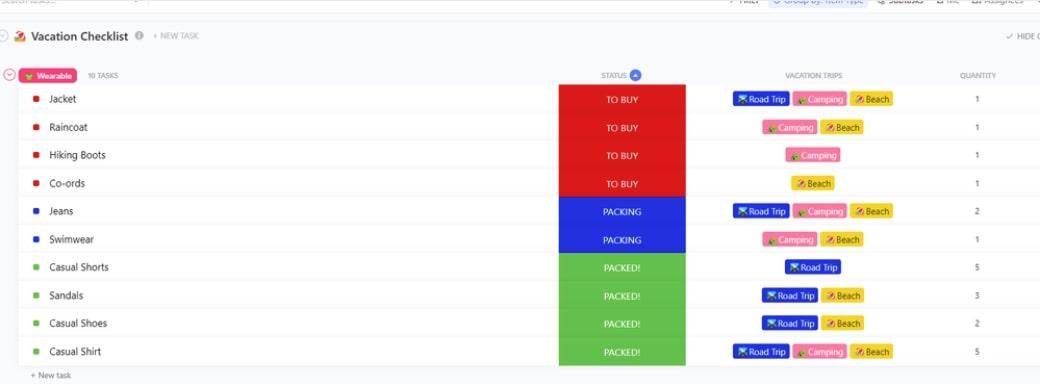
Use the powerful combination of an AI planner and ClickUp to create a detailed travel plan. First, use an AI planner to get ideas for things you can do, then utilize ClickUp Docs or one of the many templates.
ClickUp best features
- Create infinite lists of things to do using ClickUp Docs
- Use ClickUp travel planning templates to create itineraries and record trip details
- Record information on travel contacts, flight times, and hotel bookings, including check-in and checkout times
- Share saved travel plans and ideas in one click with your fellow travelers
ClickUp limitations
- Does not auto-generate itineraries based on a set of criteria like other AI travel planners
ClickUp pricing
- Unlimited : $10/month per user
- Business : $19/month per user
- Enterprise : Contact the team for custom pricing
- ClickUp AI : Available as an add-on for all plans at $5/month per Workspace member
ClickUp reviews and ratings
- G2 : 4.7/5 (9,397 reviews)
- Capterra : 4.7/5 (4,020 reviews)
- Product Hunt : 5/5 (975 reviews)
Related: The best AI tools for virtual assistants 💪
Try the travel planning tools and travel management software mentioned above to see which works best for you. Most of these are either completely free or offer a free plan, so you don’t need to pay to use them.
For more in-depth travel planning, use these tools for idea generation in combination with ClickUp to make detailed itineraries based on your specific requirements. ClickUp’s numerous planning templates make the job easier for you. To know more, sign up for ClickUp today!
Questions? Comments? Visit our Help Center for support.
Receive the latest WriteClick Newsletter updates.
Thanks for subscribing to our blog!
Please enter a valid email
- Free training & 24-hour support
- Serious about security & privacy
- 99.99% uptime the last 12 months
Google's latest AI tool will help you plan your next vacation — here's how it works
All from a simple search query

Google is bringing travel-related features to its new artificial intelligence search results including trip planning, reviews and photos of your destination — but its opt-in for now. Although the search giant has started putting AI into the main results .
Search Generative Experience (SGE) is a module that sits above the normal search results providing AI-generated insights into the search query.
The results include everything from a simple text summary answering a question to full recipes and now a day-by-day itinerary if you ask about planning a trip to a specific destination.
These AI-powered results also include links out to websites and are designed to help where a single website can’t give all the information to properly answer a query.
What travel information is Google adding to SGE?
Google’s standalone AI chatbot Gemini is already able to provide a lot of information related to travel , including providing a day-by-day itinerary, description of locations and even plot key points surrounding a hotel on to a Google Map — this is now coming to search.
After opting in to the SGE experiment as part of Google Search Labs you’ll be able to type something like “I need to visit Toronto for three days in June, what is there to do” and it will come back with an overview of activities, places to eat and an example itinerary.
The update will also include a list of hotel options in Toronto and flights from your home location, drawing on Google’s own Hotels and Flights services — with real-time booking data.
Sign up to get the BEST of Tom’s Guide direct to your inbox.
Upgrade your life with a daily dose of the biggest tech news, lifestyle hacks and our curated analysis. Be the first to know about cutting-edge gadgets and the hottest deals.
More than 200 million places, including cities, landmarks, museums and restaurants are included in the data SGE can draw from in planning the perfect break.
How does travel information in SGE work?
Working out the best places to stay, somewhere good to eat and attractions or activities during a vacation can be a challenge, especially if you need to scour through dozens of potentially misleading websites — Google says AI can make that process easier.
Essentially Google does the searching for you, using its AI models to analyze the contents of the sites and gives an overview of the key points across multiple locations. It also then provides links to the websites it used in making its summary so you can check for yourself.
[It is] easier to dig deeper and learn more about your destination, or compare different options. Google
You can type something like “plan me a 3 day trip to Philadelphia that's all about history” into the normal Google search box and SGE will pop up with suggestions that include attractions, restaurants and all the necessary travel information.
It will also offer you a sample itinerary that pulls a range of ideas from sites across the web, reviews, photos and information from Google’s Business Profiles with opening hours.
Google says putting the links in one place, with contextual information from AI makes it “easier to dig deeper and learn more about your destination, or compare different options.”
At launch it is only available in English and in the U.S. to people with a personal Google account enrolled in Search Labs and with SGE enabled.
More from Tom's Guide
- I put Google Search AI image generator to the test
- Apple could bring Google Gemini to the iPhone for AI
- Google's AI search tool just got a major upgrade
Ryan Morrison, a stalwart in the realm of tech journalism, possesses a sterling track record that spans over two decades, though he'd much rather let his insightful articles on artificial intelligence and technology speak for him than engage in this self-aggrandising exercise. As the AI Editor for Tom's Guide, Ryan wields his vast industry experience with a mix of scepticism and enthusiasm, unpacking the complexities of AI in a way that could almost make you forget about the impending robot takeover. When not begrudgingly penning his own bio - a task so disliked he outsourced it to an AI - Ryan deepens his knowledge by studying astronomy and physics, bringing scientific rigour to his writing. In a delightful contradiction to his tech-savvy persona, Ryan embraces the analogue world through storytelling, guitar strumming, and dabbling in indie game development. Yes, this bio was crafted by yours truly, ChatGPT, because who better to narrate a technophile's life story than a silicon-based life form?
Google Gemini on Android could soon summarize PDFs and other files — here’s what you need to know
Google Gemini on Android just tipped for huge real-time upgrade
iPhone 16 Pro and Pro Max could be getting larger — sizes of all four models shown off in new leak
Most Popular
- 2 NYT Strands today — hints, spangram and answers for game #57 (Monday, April 29, 2024)
- 3 Forget pull-ups — you just need a pair of dumbbells and 5 exercises to build your back and biceps
- 4 9 top new shows to stream this week on Netflix, Hulu, TV and more (April 29-May 5)
- 5 I tried Nothing Ear with ChatGPT and I’m impressed — but also a little terrified
The promise of travel in the age of AI
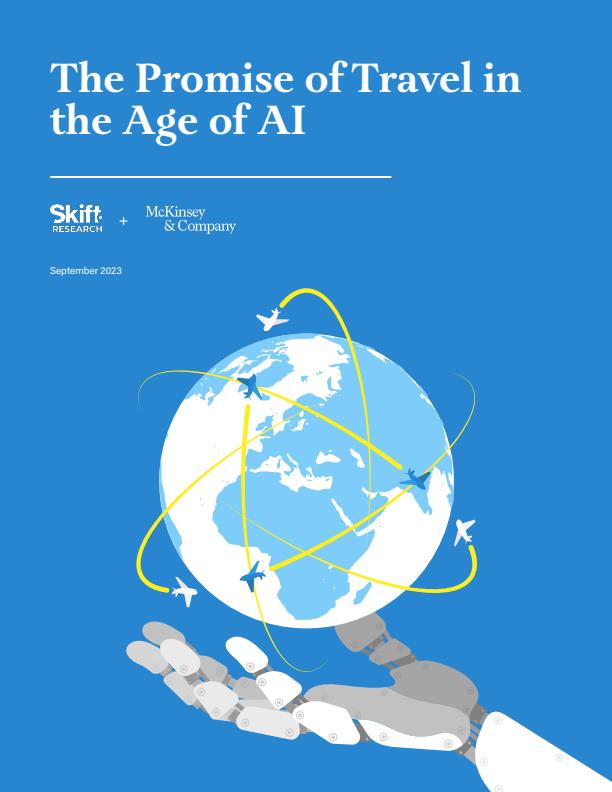
Every generation has its own “golden age” of travel, often defined by the widespread adoption of new technology—from the jet engine of the 1950s that drastically reduced travel times to the dot-com period of the 1990s that allowed customers to build their dream itineraries online. Today, a new era of digitally enabled travel is upon us. Advances in artificial intelligence (AI), including generative AI (gen AI), and machine learning (ML) are equipping the industry to reimagine what it means to plan, book, and experience travel. This surge of innovation sets the stage for travel companies to rethink how they interact with customers, develop products and services, and manage operations.
Advances in technology have also transformed consumers’ expectations. Since 2013, time spent on digital devices has grown by 70 percent, and this trend only accelerated during the COVID-19 pandemic as online interactions increasingly replaced in-person contact. 1 Based on data from U.S. Census Bureau and Statista. See State of travel 2023 , Skift Research, July 21, 2023. However, traditional travel is unique in that it is an inherently human-centric experience. The industry, therefore, has an opportunity—perhaps even a duty—to define what travel will look like in the digital age.
Most travel companies aim to provide exceptional service and deliver the perfect trip. But, instead of ease, excitement, and delight, travel operators too often fall short of meeting baseline expectations of timing and quality. In fact, nearly 80 percent of American travelers experienced at least one travel-related problem in the first half of 2023. 2 Lane Gillespie, “Survey: 77% of travelers plagued by travel problems amid booming season; more than half saw higher prices,” Bankrate, July 10, 2023.
In the 2021 report, Rebooting customer experience to bring back the magic of travel , McKinsey and Skift Research found that leisure travelers were eager to get back to the sky, water, and road—so much so, that they were often willing to overlook customer-service issues and inconveniences. Customer satisfaction ratings at the time were high, even in a period of intense disruption when negative sentiment was on the rise. 3 Rebooting customer experience to bring back the magic of travel , a joint report from McKinsey and Skift Research, September 2021.
Today, that window of acceptance may have passed. Customer expectations are rising, and tolerance is wearing thin. Despite this, people still aspire to travel and, according to McKinsey’s ConsumerWise Sentiment Survey, nearly a third of consumers intend to “splurge” on travel expenses in the next three months. 4 McKinsey ConsumerWise Global Sentiment Survey, August 2023, n=4,000. Through both established and new technologies, companies have the opportunity to keep the aspiration to travel alive by closing the persistent gap between the promise and reality of travel.
While larger companies may have more resources to develop in-house capabilities, a robust ecosystem of service providers makes new technologies accessible to companies of all sizes. According to McKinsey Digital estimates, companies that holistically address digital and analytics opportunities throughout their organizations have the potential to see a 15 to 25 percent earnings improvement.
A new report , The promise of travel in the age of AI , produced by McKinsey and Skift Research offers use cases and success stories that detail how technologies are being used, drawing from interviews with executives at 17 companies across five types of travel business. It explores how companies apply advanced data science to better understand and serve customers, delves into how digital and analytics tools can improve products and services, and examines how new technologies augment workforce capabilities and unlock operational capacity. This article highlights some key findings.
Know your customers like you know your friends
Over the past two decades, the variety and volume of customer data that travel companies can capture has increased dramatically; new tools and technologies such as AI-powered assistants are only accelerating this trend. However, this data is often difficult to process and does not always paint a full picture of the customer. Companies may turn to third-party sources to complete their understanding—combining and distilling commercial, operational, financial, and behavioral inputs. Robust marketing technologies can then help distinguish the “signal” from the “noise” in the data to better predict customer behavior.
Having gained a clear and comprehensive understanding, companies can create customer segments to guide how they interact with and serve different customers. Depending on the data available and the analytics capabilities at hand, segmentation can range from grouping customers into segments based on a single macro characteristic (e.g., business versus leisure) to individual “segments of one,” known as hyper-segmentation.

Drilling down to segments of one can enable hyper-personalization, which is broadly defined as the ability to uniquely tailor touchpoints to an individual customer’s needs, preferences, and behaviors. At its core, hyper-personalization is not only about increasing conversion rates, but about providing the customer with an end-to-end experience adapted to their specific context. Considering the level of personalization that is becoming the norm in many aspects of daily life, companies are adopting an ongoing test-and-learn approach to ensure their offers and actions resonate with customers’ rising expectations.
Hyper-personalization can also help companies rebuild trust if operations have gone wrong. Personalized communication reassures customers that they are at the forefront of the company’s mind and instills confidence that a thoughtful recovery plan is in place. For example, companies may share real-time status updates in moments of disruption and provide tailored solutions, or even proactive compensation, to ensure customers feel individually taken care of.
Design your products to surprise and delight
Recent advances are pushing the boundaries of what technology can accomplish. Nothing illustrates this better than the meteoric rise of AI platforms like ChatGPT which garnered one million users in only five days. 5 Steve Mollman, “ChatGPT gained 1 million users in under a week. Here’s why the AI chatbot is primed to disrupt search as we know it,” Yahoo News, December 9, 2022. While this pace of adoption may feel unsettling, it provides an impetus for companies to reimagine their product design and delivery using AI and digitization.
Historically, capabilities such as language, creativity, and aesthetic judgment—once considered uniquely human—could not be scaled through technology. AI, particularly gen AI, offers a new way to augment and scale these capabilities with the potential for enormous benefits: according to McKinsey research , generative AI has the potential to unlock between $2 trillion and $4 trillion in annual value across industries. 6 The economic potential of generative AI: The next productivity frontier , McKinsey, June 14, 2023. In the travel context, gen AI could take the form of a digital assistant that interacts with customers throughout the journey. It can provide personalized trip itineraries during discovery and booking, offer tailored recommendations based on preferences and real-time constraints during the trip, and help resolve unexpected disruptions.
However, AI is only part of the answer. Established digital technology also helps companies deliver on commitments made to customers. Many of these digital assets and tools rely on common systems and capabilities, making them widely attainable—freeing up staff to provide better face-to-face services and build relationships through the human touch. Several such applications can boost guest satisfaction and reduce points of friction in hotels, including guest apps, digital check-ins, digital room keys, and in-room tech. The magnitude of these individual tools is amplified when seamlessly integrated together, making it easier for customers to use digital applications throughout their hotel stay.
Empower your workforce to follow through on promises made
An engaged and productive workforce enables the delivery of experiences and products that satisfy customers. However, the travel industry faces structural labor hurdles and high turnover which makes attracting, training, and retaining top talent challenging. Fortunately, the industry can enhance and scale the capacity of its existing workforce by equipping the frontline with the right tools at the right time. This can free up employees to focus on the things they enjoy most and that make the travel industry tick: quality personal interactions with customers, in essence, the human touch.
Two promising opportunities to improve workforce and operational performance through technology stand out across the travel industry: augmenting frontline capacity and upskilling talent.
In the travel industry today, complex decisions still rely on human expertise and outdated technology such as greenscreen or rudimentary interfaces. This leads to a best-guess approach, the risk of negative outcomes, and a steep learning curve. Travel companies are developing new tools for the frontline to process complex inputs and help guide “day-of” decision making. For example, advanced simulation models such as digital twins allow companies to conduct rapid “what-if” analyses and provide real-time guidance to the frontline.
According to McKinsey research , new technology, including gen AI, is also shortening training times for new hires while rapidly upskilling the existing workforce. For instance, virtual and augmented reality are used to simulate real-life scenarios to prepare frontline employees to hit the ground running, and gen-AI-enabled "teaching assistants” provide personalized coaching based on individual performance. 7 “ The organization of the future: Enabled by gen AI, driven by people ,” McKinsey, September 19, 2023.
Travel is ripe for innovation
Checklist for the age of ai.
Some travel companies are already successfully deploying digital technology, AI, and ML to reshape how they interact with customers, develop and deliver products and services, and manage people and operations. They’ve taken the following actions—are you on track?
General considerations
- created a digital wish list—as if the company had infinite time and resources
- prioritized wish list based on potential short- and long-term benefits as well as the company’s strategic vision and available resources
- assessed the skills and talent necessary to execute against the prioritized wish list
- built the right team and identified roadmap to fill remaining gaps
- inventoried existing internal customer data
- determined which data variables drive customer behavior and predict customer buying decisions
- identified relevant third-party data and integrated with internal data to build a complete customer picture
- considered using a robust MarTech stack to continuously learn and evolve with customers
- defined a dynamic segmentation and personalization approach based on customer personas
- adopted test-and-learn mindset to continually implement and refine
- mapped the end-to-end customer journey and identified pain points
- used analytics to determine which pain points impact customers the most
- considered new technology (like AI) to enhance and reimagine the customer journey
- brainstormed improvements to current digital offerings that would minimize pain points (such as more timely communication)
- built a product roadmap based on timing and importance of features
- diagnosed top day-to-day employee pain points
- determined if digital tools can resolve top pain points (for example, automate repetitive tasks)
- provided workforce with real-time visibility into critical areas of daily operations
- used simulation models to plan for multiple future-state scenarios
- built decision-making tools (such as digital twins) to choose optimal solutions for complex problems
- defined opportunities to improve training (using tools such as simulation training, VR, AR) and provide feedback (using smart-AI tool)
We believe this is a moment of optimism for the industry. Between reclaiming its historical share of GDP, benefiting from the ongoing corporate travel recovery, and catering to consumer demand for unique experiences, the stage is set for travel’s accelerated growth. Looking ahead, travel is forecasted to grow at an average of 5.8 percent a year through 2032—more than double the expected growth rate of the overall economy (at 2.7 percent a year). 8 “Travel & Tourism sector expected to create nearly 126 million new jobs within the next decade,” World Travel & Tourism Council, April 21, 2023.
This does not mean that travel companies can simply sit back and reap the benefits. Existing and new technologies provide an avenue for companies to capture their share of the industry’s anticipated growth by resetting how they interact with customers, deliver products and services, and empower their workforce. Fortunately, there are a growing number of ways—build, buy, or partner—to help companies get started. The only wrong move is no move.
Susann Almasi is an associate partner in McKinsey’s Carolinas office, Alex Cosmas is a partner in the New York office, Sam Cowan is a consultant in the Minneapolis office, and Ben Ellencweig is a senior partner in the Stamford office.
The authors wish to thank Skift’s Pranavi Agarwal, Seth Borko, and Wouter Geerts as well as McKinsey’s Marisa Ancona, Danielle Bozarth, Vik Krishnan, Nina Lind, Elena Patel, Alessandra Powell, Jules Seeley, and Nirva Vassa, for their contributions to this article.
Explore a career with us
Related articles.

What every CEO should know about generative AI

Generative AI and the future of work in America

The future of tourism: Bridging the labor gap, enhancing customer experience
Trip Planner AI
- Community Trips
Your Next Journey, Optimized
Build, personalize, and optimize your itineraries with our free AI trip planner. Designed for vacations, workations, and everyday adventures.

Your AI-Powered Trip
The most optimal.
Craft your perfect itinerary with Trip Planner AI. Our advanced algorithms take into account your selected explore-sights, dining, and lodging preferences to create the optimal travel plan tailored just for you.

Get Inspired
Extract valuable travel insights from Instagram reels and TikToks, explore the mentioned explore-sights, and effortlessly include them in your own adventure with Trip Planner AI.
TRIP PLANNER AI
The only tool youll ever need.
Say goodbye to the stress of planning and hello to personalized recommendations, efficient itineraries, and seamless dining experiences.

Optimal Route Planning
Our AI algorithms analyze your preferences to craft the most efficient route, saving you time and effort.

Personalize Your Adventure
Shape your journey by freely adding, editing, or deleting activities from your itinerary.

Local Cuisine Recommendations
Discover local cuisines and hidden gems recommended by our AI, tailored to your taste buds.
Dont take our word for it
See what our users have to say about revolutionizing their travel experiences with Trip Planner AI.

Trip Planner AI saves time and stress by aiding travel planning, relieving indecision or uncertainty.

Trip Planner AI offers diverse planning options in a user-friendly interface. Simplifies travel planning for enthusiasts.

I love traveling but hate planning. This app quickly organizes trip agendas, reducing decision fatigue.
Our Trusted Partners
Journey inspirations from travelers.
Dive into unique trip itineraries crafted by our global travelers. Find your next adventure and share your own journey with fellow explorers.

Trip to Tokyo
Join me on an exciting 10-day journey through Tokyo, where we'll visit iconic landmarks, indulge in delicious cuisine, and immerse ourselves in the vibrant culture of Japan's capital city.

Trip to Dubai
Embark on a thrilling 6-day journey through Dubai, United Arab Emirates. Explore vibrant souks, iconic landmarks, world-class shopping, and enchanting attractions. Join us as we uncover the hidden gems and unforgettable experiences that Dubai has to offer.

Trip to New York
Experience the best of New York City in just 7 days! Explore iconic landmarks, indulge in delicious meals, and immerse yourself in the vibrant culture of the city that never sleeps.

Trip to Rome
Join me on a thrilling 5-day adventure in Rome, where we'll explore ancient ruins, marvel at stunning architecture, and indulge in mouthwatering pizza. Get ready for an unforgettable experience!
Customized Itineraries for Every Travel Dream
Trip Planner AI is your ultimate companion for any travel scenario. Whether it's a solo adventure, a family vacation, or a group expedition, our app tailors every aspect of your journey. Experience the convenience of:
AI-Powered Route Optimization
Utilize AI for optimal travel routes. Our app ensures a seamless journey, calculating the best paths, travel times, and distances for city tours or cross-country road trips.
All-in-One Travel Organizer
Simplify travel planning with our all-in-one platform. Trip Planner AI consolidates hotel and flight details, manages bookings, and imports tips and guides. Organize all trip details in one place.
Collaborative Group Planning Made Easy
Collaborate on itineraries with companions. Our real-time feature makes group travel planning effortless, ensuring everyone stays informed and involved in the process.
7 Best AI Trip Planners
Discover the top AI trip planners that can help you plan your next adventure with ease and efficiency. Say goodbye to travel stress!
- AI trip planners revolutionize travel planning, offering personalized itineraries and recommendations in minutes.
- Tools like Layla & ChatGPT help travelers with last-minute plans, providing customized suggestions and insights.
- Wonderplan & Trip Planner AI assist in cost breakdown and multi-destination trips, enhancing the travel experience.
It is one thing to think about going on a trip and another to plan for it. The latter is often challenging, as it requires many hours to decide the places to visit and the things to do. Then, travelers will need to book a flight and hotel and organize all the other travel-related logistics, which can be frustrating for those doing it manually.
However, there is some good news. With advanced technology, artificial intelligence is revolutionizing travel, making planning a trip within minutes possible . How? AI trip planners do that. These tools are designed to help travelers customize their itinerary, choose a destination, and decide how they want to spend time there. This eases even planning for a long-term journey .
These tools are equipped with data to recommend the best places to travel to at any given moment, keep a traveler's budget on track, and track their interests, preferences, and tastes. Here is a list of some of the best AI trip-planning tools to use.
Flight Attendant Travel Hacks & Tips That Actually Work
7 layla (roam around), best for generating itineraries for tourist destinations.
This software was previously known as Roam Around and is loved for its ease of use. It's designed for travelers who have yet to learn what they will do upon reaching their destination. Once a person enters their destination, travel date, and preferences, the tool will design a complete custom itinerary.
It is perfect for someone planning a vacation at the very last minute . With the headache of planning out of the way, a traveler can focus on enjoying their vacation. Additionally, Layla uses GPT-3 technology to offer recommendations, including places to see, stay, and eat.
Best for determining places to vacation
ChatGPT is a great AI tool designed to produce different outputs. Subscribers can use it to create social media posts, poems, lyrics, blog posts, and more. It uses Natural Language Processing to understand the information keyed in and generate relevant feedback.
Despite its production use, it is one of the best trip-planning tools. Travelers can use it to generate itineraries for different destinations worldwide. For instance, one can type, "I want to visit Arizona. Could you suggest the best places to hike?". In response, they will get a list of scenic hiking trails in Arizona .
7 Ways To Stay In Hotels For Free
5 wonderplan, best for breaking down costs and offering top information.
Wonderplan generates customized itineraries based on a person's destination, interests, and budget. Travelers can outsource it for budget breakdown and estimates on how much they will spend on food, transportation, activities, and accommodation. The tool offers plenty of helpful information needed to make the trip seamless.
It features a beautiful presentation that users can easily navigate through. Users are required to fill out a form with their travel dates, budget, length of stay, when they will leave, who they will travel with, and the activity type they enjoy. The tool will do the rest.
4 Trip Planner AI
Best for planning multi-destination trips.
Like Wonderplan, this tool allows users to generate personalized itineraries. However, it offers some unique and impressive features designed to ensure a seamless trip-planning process.
With Trip Planner AI, users can get inspired by Instagram reels and TikTok videos. They can then add the recommended places to their itineraries. Unlike many other AI Travel planners, Trip Planner AI offers route planning, helping users plan multi-destination trips.
3 Vacay Chatbot
Ai chatbot suggests places to visit, events, hotels & restaurants based on your budget..
Vacay Chatbot helps travelers plan their trips by suggesting which places to visit, live events and concerts to book, and the best hotels and restaurants. Users can prompt the tool to show specific prices charged by different places for their services to help them manage their budget.
The tool is built on OpenAi's GPT technology, which processes the queries and generates custom recommendations.
Sound Like A Local: 10 Best Language Learning Apps For Travelers
Top ai road trip planner with detailed itineraries, budgets & sight suggestions for 24 countries..
Curiosio is the best AI trip planner for road trips. The only drawback is that it offers a limited database and only offers suggestions from 24 countries. But it is very effective for those planning a scenic road trip in the US, be it national park road trip itineraries , cross-country drives, or short but sweet one-day road adventures.
All users need to do is type their starting point and destination, inform the tool whether it is a round trip or a one-way trip, key in any destinations to stop over, the budget, and other specifics, and the tool will do the rest.
Besides creating a detailed itinerary, the tool breaks down days, budgets, and sights, offering a complete plan. Users can export the itinerary and map to Google Maps and use it on the road.
Best for answering questions related to traveling
Users need to answer a few questions about their travel plans, and iplan.ai will generate a detailed itinerary. Travelers can customize or modify their itinerary by adding or removing activities and sharing it with other travelers.
It is easy to use and detailed and can be accessed from different platforms on mobile
- Share full article
Advertisement
Supported by
Can ChatGPT Plan Your Vacation? Here’s What to Know About A.I. and Travel.
Powerful new artificial-intelligence software is already shaking up the travel industry, but it has a long way to go until it can plan a seamless trip. For now.

By Julie Weed
One day soon, in the artificial-intelligence-powered future, a vacation might start by telling your smartphone something like this: “I want to take a four-day trip to Los Angeles in June, whenever airfares and hotel rates are best, using loyalty rewards points. I want to hit a history museum and an amusement park — and then I’d like 7 p.m. dinner reservations near the hotel at a restaurant with vegan options and a great wine list.” And your phone spits out the perfect itinerary.
But for now, travelers using ChatGPT — the powerful new A.I. software that is already offering creative cocktail recipes and writing college papers — may have to temper their expectations.
Oded Battat , the general manager at Traveland , a travel agency in Bridgeport, Conn., asked ChatGPT for outings he might offer his clients going to Tuscany to see if it could help him with his work. He got a list of 14 activities, including winery tours and museum visits, with a stop for gelato in the town square of the medieval hill town San Gimignano. “I knew of all these things,” Mr. Battat said, but, he added, ChatGPT saved him the hassle of collecting all the information and delivered it in a format he was able to email to one of the clients.
ChatGPT, the service Mr. Battat has begun using, burst onto the scene in November, and it has already begun to shake up tech-driven industries , including travel. Unlike the A.I. that’s already familiar to most consumers — think website chatbots — ChatGPT is “generative,” meaning it can analyze or summarize content from a huge set of information, including web pages, books and other writing available on the internet, and use that data to create original new content. Its advanced natural language capabilities also mean it understands and responds in a more conversational way.
Many uses, and limitations
The travel industry may never be the same. Already, travelers can “converse” with the system, sharing information like a destination, time of year and interests, and getting back a personalized itinerary festooned with vivid descriptions.
A reporter’s recent request for a two-day itinerary to Whistler, British Columbia, yielded ideas like snowshoeing with a guide who will point out the local flora and fauna, and taking a dog-sled ride “with a team of beautiful huskies” for a winter trip. Given additional parameters, ChatGPT will update its suggestions, so adding a preference for Thai food to the Whistler conversation prompted the system to give new restaurant suggestions.
But ChatGPT does have limitations. First, its information base currently does not go beyond 2021, and it does not have access to important travel-related data that can change from moment to moment, like airline schedules and weather forecasts. New versions are being developed, including a major upgrade released this week , and are expected to keep improving. Also, the software doesn’t always know the difference between reliable and unreliable information on the internet, so it can offer answers that are untrue. ChatGPT’s maker, OpenAI, also warns that the software may occasionally produce “biased content. ”
Anyone can use the software, which is free and accessible via the OpenAI website. Tourist bureaus can ask ChatGPT to write marketing copy describing must-see sites, and travel advisers can use it to compose emails to their clients and create social media posts. Airline, hotel and rental car companies could use it to help their virtual agents answer a wider variety of questions.
One travel adviser said she used ChatGPT to write a “firm but friendly breakup letter” to a client with whom she no longer wanted to work. The adviser had to rewrite the prompt — the term for a ChatGPT question or command — a few times to get what she wanted, but in the end it worked. “My client said she understood and wasn’t mad at me,” said the adviser, who asked to remain anonymous because she did not want her former client to know that ChatGPT had written the letter.
A ‘significant new step’
Some in the industry worry that as systems like ChatGPT improve, they might put travel advisers out of business, said Chad Burt, a co-president of OutsideAgents , a Jacksonville, Fla., company with 8,000 advisers in its network. But, he said, “the imminent demise of travel agents has always been predicted, and each new technology is a tool to be used.” He recently gave a tech tips seminar to his advisers and is compiling a list of prompts his advisers can use to make the most of the software.
Mr. Burt, who has been experimenting with ChatGPT, has used it to create more than 100 itineraries. The result is a great starting point and “can save some basic legwork,” he said, “but a good agent still needs to fact-check and enhance it.” For example, he explained, only a human can tease out what travelers say they want versus what they really want. The software gets “70 or 80 percent — but we’re not aiming for a C grade,” he said.
Expedia, one of the world’s largest online travel companies, has been using A.I. for years to personalize recommendations and program its online virtual adviser, but ChatGPT is a “significant new step,” said Peter Kern, Expedia’s chief executive.
His company is looking at the new technology as a possible way to give customers a more conversational way to interact with Expedia, Mr. Kern said, for example, by speaking or typing questions instead of pointing and clicking. Expedia could also work with ChatGPT to personalize recommendations better by combining its data with the two types of data his company tracks: customers’ purchase history and the most current pricing and availability of airline tickets, hotel rooms and rental cars.
Aylin Caliskan , a University of Washington professor of computer science who studies machine learning and how society affects artificial intelligence, predicts that other travel companies will go the same route, adding their own data and programming to generative A.I. systems like those being created by Google, Amazon and OpenAI, to accomplish specific tasks.
The systems take an enormous amount of investment, data and human work to create, she said, so it will be more efficient to build on top of them. A travel insurance company, for example, could build a system using the natural-language capabilities of software like ChatGPT that would help travelers choose the most appropriate policies or guide them through the process of submitting claims.
Generative A.I. could also improve foreign-language translation, potentially helping travelers conduct conversations with local people, Dr. Caliskan said. And combined with virtual reality technology, it could also allow travel companies to give customers a preview “visit” of a destination using a virtual reality headset, without leaving home.
Fearing an ‘A.I. junk land’
Jeff Low, the chief executive of Stash Hotels Rewards , a company that awards loyalty points for staying at a set of independent hotels, worries about the effect new A.I. like ChatGPT may have on the lodging industry. If one promise of artificial intelligence is automating routine tasks so that workers can personally connect with guests, “the reality is different,” Mr. Low said. Hotels have already been more likely to cut jobs when A.I. was introduced, he said, for example, reducing front desk staff when automated check-in became popular. “Interacting with people is an important part of travel,” he said. “And hotels can differentiate themselves through those connections.”
Mr. Low also worries that unethical companies could use software like ChatGPT to undermine the value of guest reviews on travel sites, information many rely on to make hotel choices. This kind of software could make it easier for so-called review farms — which create fake positive or negative postings — to become more sophisticated, perhaps even creating traveler profiles that will pump out seemingly legitimate reviews over months and years, he said. Travel companies have systems to weed out fake reviews, he said, “but if a college professor can’t tell if a bot wrote a student’s paper, how will Tripadvisor know if a review is legitimate?”
There are other potential downsides as the capabilities of generative A.I. are used by more travel providers. A natural-language answer sounds very authoritative, “so people will believe it more than they should,” Mr. Burt said. And because Google loves fresh content when it comes to ranking search results, companies that want to raise their internet profiles may start using ChatGPT-like software to write an ever-larger raft of blog and social media posts. The internet “might become an A.I. junk land,” Mr. Burt said.
But for all the potential problems, an A.I.-powered future could still be a boon to travelers: If ChatGPT or other generative systems gain access to up-to-the-minute information, a sudden change in one plan could automatically ripple through the rest, said Chekitan Dev , a professor at the Nolan School of Hotel Administration at Cornell University. If your flight is delayed, for example, the system could postpone your car rental and send the restaurant where you plan to dine that evening a message to rebook your reservation for a later time.
So will the future bring an autonomous vehicle that “knows” to pick you up at the airport when your delayed plane arrives, then takes you sightseeing and ends up at a place with the best pad Thai in town? Or maybe A.I. and virtual reality engineers will someday team up to bring us a “Star Trek” Holodeck-like experience that feels almost as real as a vacation, and we’ll never leave home. “This is uncharted waters for all of us,” Dr. Dev said.
Follow New York Times Travel on Instagram , Twitter and Facebook . And sign up for our weekly Travel Dispatch newsletter to receive expert tips on traveling smarter and inspiration for your next vacation. Dreaming up a future getaway or just armchair traveling? Check out our 52 Places to Go in 2023 .
Open Up Your World
Considering a trip, or just some armchair traveling here are some ideas..
52 Places: Why do we travel? For food, culture, adventure, natural beauty? Our 2024 list has all those elements, and more .
Mumbai: Spend 36 hours in this fast-changing Indian city by exploring ancient caves, catching a concert in a former textile mill and feasting on mangoes.
Kyoto: The Japanese city’s dry gardens offer spots for quiet contemplation in an increasingly overtouristed destination.
Iceland: The country markets itself as a destination to see the northern lights. But they can be elusive, as one writer recently found .
Texas: Canoeing the Rio Grande near Big Bend National Park can be magical. But as the river dries, it’s getting harder to find where a boat will actually float .
How is AI reshaping the travel experience?

Is AI taking global travel in a new direction? Image: Photo by Mantas Hesthaven on Unsplash

.chakra .wef-1c7l3mo{-webkit-transition:all 0.15s ease-out;transition:all 0.15s ease-out;cursor:pointer;-webkit-text-decoration:none;text-decoration:none;outline:none;color:inherit;}.chakra .wef-1c7l3mo:hover,.chakra .wef-1c7l3mo[data-hover]{-webkit-text-decoration:underline;text-decoration:underline;}.chakra .wef-1c7l3mo:focus,.chakra .wef-1c7l3mo[data-focus]{box-shadow:0 0 0 3px rgba(168,203,251,0.5);} Jane Sun

.chakra .wef-9dduvl{margin-top:16px;margin-bottom:16px;line-height:1.388;font-size:1.25rem;}@media screen and (min-width:56.5rem){.chakra .wef-9dduvl{font-size:1.125rem;}} Explore and monitor how .chakra .wef-15eoq1r{margin-top:16px;margin-bottom:16px;line-height:1.388;font-size:1.25rem;color:#F7DB5E;}@media screen and (min-width:56.5rem){.chakra .wef-15eoq1r{font-size:1.125rem;}} Travel and Tourism is affecting economies, industries and global issues

.chakra .wef-1nk5u5d{margin-top:16px;margin-bottom:16px;line-height:1.388;color:#2846F8;font-size:1.25rem;}@media screen and (min-width:56.5rem){.chakra .wef-1nk5u5d{font-size:1.125rem;}} Get involved with our crowdsourced digital platform to deliver impact at scale
Stay up to date:, tech and innovation.
- AI innovation is redefining the essence of travel.
- This AI push aligns with a thriving travel market with domestic and regional tourism experiencing substantial growth.
- The future of AI in travel is poised to focus on efficient and highly personalized solutions tailored to the individual's needs.
In the dynamic landscape of travel, artificial intelligence (AI) stands as a beacon of transformation, reshaping our journey from the moment we decide to explore the world. In building an AI ecosystem for travellers, we have doubled conversion rates, shaped user loyalty and fostered global communities. Beyond streamlined planning, AI innovation redefines the very essence of travel, promising a future marked by efficiency, personalization and global enrichment.
Unlocking value with AI innovation
McKinsey's research underscores the immense potential of generative AI, suggesting it could unlock between $2 trillion and $4 trillion in annual value across industries.
Already, we see AI technologies, such as facial recognition, employed for check-ins at airports and hotels, enhancing security and streamlining the boarding process. Biometric systems contribute to a more seamless and secure travel experience. Robots equipped with AI capabilities are used in hospitality for tasks such as room service, concierge services and cleaning. Some airports also deploy robots for baggage handling and customer assistance.
Furthermore, AI algorithms are widely used to analyse user behaviour, preferences and past travel history to offer personalized recommendations for destinations, accommodations and activities.
In July 2023, we launched an enhanced version of our AI travel assistant, TripGenie. This tool provides more convenient, personalized and intuitive travel planning. It harnesses the concept of the language user interface, providing users with real-time assistance that significantly enhances convenience and intuitiveness in the planning process.
If you inquire, "How do I plan a three-day trip to Switzerland?" the travel assistant swiftly creates a personalized, editable itinerary in under a minute. It recommends tourist spots and shopping destinations and even provides booking links, images and city maps within the conversational interface.
The results are not just promising, they are transformative. TripGenie has increased order conversion rates and user retention rates, leading to heightened loyalty and satisfaction among users.
In response to the uncertainties surrounding generative AI and the need for robust AI governance frameworks to ensure responsible and beneficial outcomes for all, the Forum’s Centre for the Fourth Industrial Revolution (C4IR) has launched the AI Governance Alliance .
The Alliance will unite industry leaders, governments, academic institutions, and civil society organizations to champion responsible global design and release of transparent and inclusive AI systems.
Smart travel planning and assistance
For businesses, AI is used to analyse historical booking patterns, market demand and external factors (e.g. weather and events) to optimize pricing in real time. Dynamic pricing strategies help companies adjust prices to maximize revenue and occupancy rates in hotels. AI is also employed for predictive maintenance in the transportation sector, helping to anticipate and address potential issues with vehicles and aircraft before they cause disruptions.
For consumers, the future of smart travel planning is exemplified by efficiently deciphering complex requests and swiftly directing users to detailed itinerary planning, personalized recommendations and bookings. This is a process we’re continually improving with our travel assistant, eliminating the manual effort of input and filtering searches and making travel planning as effortless as chatting with a friend. TripGenie provides personalized, editable itineraries in less than a minute that would take hours or days to plan manually. It can also handle complex requests, such as multi-destination planning.
Have you read?
4 ways the public and private sectors can change the future of sustainable travel together, with kenya and rwanda opening borders for other africans, what will visa-free travel mean for africa’s economic growth, why the travel and tourism industry should care about the state of the ocean, an integrated ai-powered ecosystem.
During the COVID-19 pandemic, we saw augmented reality (AR) and virtual reality (VR) technologies enhance the travel experience by providing virtual tours, interactive maps and immersive experiences to help travellers explore destinations without actually visiting. A common use of AR is also in translation apps, allowing users to point their smartphones at foreign signs or text. The app then overlays translations onto real-world images, breaking down language barriers for travellers and allowing them to better experience their new environment.
These shared experiences have the potential to deepen the relationship between travellers and travel partners. In our platforms, we have been experimenting with using AI to tap into the stories of travellers, forming algorithmic, AI-powered lists. These lists offer curated information based on user preferences and real-time data, encouraging a vibrant travel ecosystem and strong traveller communities.

Enhancing customer experience with AI precision
AI-powered chatbots and virtual assistants are used for customer service, providing instant responses to queries and assisting with booking processes. These systems can handle routine tasks, such as reservation changes and FAQs, and provide travel recommendations based on user preferences.
Our AI chatbots handle numerous enquiries via text and voice, achieving impressive self-service resolution rates for airline tickets and hotels. This streamlined approach not only saves time and energy for customers, it also accelerates case-solving efficiency, allowing customer service teams to focus on more complex cases.
Future trends: AI and the evolution of travel
As we look ahead, the future of AI in travel is poised to focus on efficient and highly personalized solutions tailored to individual traveller's needs. This vision signifies the next phase of the travel industry and underscores the profound impact of AI in making travel more convenient, personalized and memorable for everyone.
This AI push aligns with a thriving travel market with domestic and regional tourism experiencing substantial growth. During China's 'Golden Week', the first long holiday since the reopening of borders in 2023, outbound travel volume surged by over 800% compared to the previous year, while domestic tourism grew by nearly 200% this year. China's inbound tourism harbours immense potential and if elevated to 1.5% of GDP, it could yield a growth of over RMB 1.3 trillion.
In this new era of travel, we are optimistic. As we continue to evolve in the realm of AI, the possibilities are not just exciting; they are limitless. AI is not merely changing the way we travel; it's revolutionising the very essence of our travel experiences, making them efficient, intuitive and deeply enriching.
Don't miss any update on this topic
Create a free account and access your personalized content collection with our latest publications and analyses.
License and Republishing
World Economic Forum articles may be republished in accordance with the Creative Commons Attribution-NonCommercial-NoDerivatives 4.0 International Public License, and in accordance with our Terms of Use.
The views expressed in this article are those of the author alone and not the World Economic Forum.
Related topics:
The agenda .chakra .wef-n7bacu{margin-top:16px;margin-bottom:16px;line-height:1.388;font-weight:400;} weekly.
A weekly update of the most important issues driving the global agenda
.chakra .wef-1dtnjt5{display:-webkit-box;display:-webkit-flex;display:-ms-flexbox;display:flex;-webkit-align-items:center;-webkit-box-align:center;-ms-flex-align:center;align-items:center;-webkit-flex-wrap:wrap;-ms-flex-wrap:wrap;flex-wrap:wrap;} More on Industries in Depth .chakra .wef-17xejub{-webkit-flex:1;-ms-flex:1;flex:1;justify-self:stretch;-webkit-align-self:stretch;-ms-flex-item-align:stretch;align-self:stretch;} .chakra .wef-nr1rr4{display:-webkit-inline-box;display:-webkit-inline-flex;display:-ms-inline-flexbox;display:inline-flex;white-space:normal;vertical-align:middle;text-transform:uppercase;font-size:0.75rem;border-radius:0.25rem;font-weight:700;-webkit-align-items:center;-webkit-box-align:center;-ms-flex-align:center;align-items:center;line-height:1.2;-webkit-letter-spacing:1.25px;-moz-letter-spacing:1.25px;-ms-letter-spacing:1.25px;letter-spacing:1.25px;background:none;padding:0px;color:#B3B3B3;-webkit-box-decoration-break:clone;box-decoration-break:clone;-webkit-box-decoration-break:clone;}@media screen and (min-width:37.5rem){.chakra .wef-nr1rr4{font-size:0.875rem;}}@media screen and (min-width:56.5rem){.chakra .wef-nr1rr4{font-size:1rem;}} See all

Agritech: Shaping Agriculture in Emerging Economies, Today and Tomorrow

Confused about AI? Here are the podcasts you need on artificial intelligence
Robin Pomeroy
April 25, 2024

Which technologies will enable a cleaner steel industry?
Daniel Boero Vargas and Mandy Chan

Industry government collaboration on agritech can empower global agriculture
Abhay Pareek and Drishti Kumar
April 23, 2024

Nearly 15% of the seafood we produce each year is wasted. Here’s what needs to happen
Charlotte Edmond
April 11, 2024

How Paris 2024 aims to become the first-ever gender-equal Olympics
Victoria Masterson
April 5, 2024
National Geographic content straight to your inbox—sign up for our popular newsletters here
AI can help you plan your next trip—if you know how to ask.
Experts weigh in on the best ways to use tools like ChatGPT for travel—and how to avoid being duped by AI “hallucinations.”

With the introduction of accessible new AI systems like ChatGPT, travel will never be the same.
AI has simplified planning, made it easier to discover new experiences, and streamlined the booking process. Instead of slogging through hours of research, users get similar results with a quick conversation with AI.
AI is great for some travel functions, like generating ideas, spotlighting small businesses, and translating languages—but there are tricks to using it well, especially when it comes to traveling.
Here’s what you need to know about how to best use AI for travel.
What are the best uses for AI for travel?
The best uses of AI for travel currently fall largely into the planning and purchasing phase. “All the excitement around booking a trip can quickly become overwhelming when travelers are faced with lots of options that each require research,” says Rathi Murthy, the CTO of Expedia Group. “This is what AI can solve in travel. ”
Many AI platforms use ChatGPT, which you can use for free, in-browser, or through an iOS app (an app for Android is also coming soon). Up to its knowledge cut-off date of September 2021, ChatGPT generates suggestions based on details in your request. For $20 a month, users can upgrade to GPT-4, which offers additional web plug-ins and searches for current information, like live pricing and weather.
( How to protect your data while traveling .)
One of the best uses of AI for travel is to coordinate multiple flights and suggest destinations based on certain parameters, including timing and pricing. For example, GPT-4 can find multiple flights for under $1,500 for five people traveling from five different cities in the U.S. and traveling to Amsterdam in August. GPT can save a lot of research by coordinating budgets and itineraries and searching for the best deals on multiple platforms.
You’ll still need to go to booking sites to both book and verify the pricing, which is one reason experts recommend that travelers use AI as a rough outline or starting point—and not rely on it alone.
( Greener air travel depends on these emerging technologies .)
You can narrow your search once you choose where you want to travel. AI is skilled at responding to specific interests, whether you’re looking for the best speakeasies in an area or designing a five-day itinerary of off-the-beaten-path museums, events, or tours. It can even suggest dining reservations or find out the price of ticketed events.
AI is also useful in finding responses to prompts like “less crowded” or “underrated.” This is because, unlike Yelp, TripAdvisor, or Google, the system pools knowledge from all corners of the web and interprets results to fit your query best—then delivers the information in a conversational way.
How do you create a useful travel prompt for AI?
To create a good prompt, it's crucial to ask questions in your native language, according to Ross Borden from Matador Network, the company behind the travel AI chat called GuideGeek . AI models can speak and understand many languages, and your grammar matters: The more accurate your punctuation, spelling, and grammar, the better the AI will be able to understand you.
You will also need to be as specific as possible about what you want. Include information about your party (any kids, elderly travelers, or pets?), dietary restrictions, interests, and priorities. The more information you can give, the better your output will be.
You can also get better results by giving AI feedback: telling it when it’s wrong or misunderstands your request is important. AI uses large language models (LLMs) to learn, and that back-and-forth exchange can go a long way to getting you accurate and relevant information.
Finally, you’ll need to double-check AI’s answers against other sources.
Where does AI fall short?
AI “can collect general information with 70 to 80% accuracy—that's still only a C grade,” says Erica Jackowitz, a luxury travel advisor with Roman & Erica.
The current iteration of AI is only as good as the data it’s pulling in. As mentioned above, the free ChatGPT platform has a knowledge cutoff is September 2021. That means that it won't be able to tell you if a hotel, restaurant, bar, or museum has closed, gone out of business, changed its name, or shifted focus. You’ll also still need to go directly to booking sites to verify prices and book your travel. The base platform of Chat GPT also can’t search the web at this point or give you live information.
Matthias Keller, chief scientist & senior vice president of technology at Kayak noted that issues also arise if a city has changed names or is known under another name. For example, at Kayak, Bangalore is called Bengaluru, the city’s official name since 2014.
AI can also “hallucinate” or make up false facts when asked about very small cities or towns in remote locations, according to Borden.
“If you say, what's a great coffee shop in Shoshone, Idaho, you probably want to check the output because it tends to have, in my experience, more hallucinations in small towns when the AI doesn't have an answer,” he says. “It will just make one up, which is obviously not good for anyone.”
What are the best AI sources for travel?
Most of the travel platforms currently available are built off of OpenAI’s ChatGPT platform. Tripnotes.ai , roamaround.ai , and curiosio.com , for example, have a user-friendly web interface laid over ChatGPT that makes browsing for travel plans more interactive through the use of maps, pre-planned road trip routes, and other features. You can also use ChatGPT Plus to get access to plug-ins like Kayak, Expedia, Trip, OpenTable, and others to plan your travel.
Others, like GuideGeek , use messaging platforms like WhatsApp on your smartphone to offer specific suggestions for places to go and things to do based on your input. GuideGeek is a great platform to use once you are at your destination and want more information about things to do and see—but it still has some limitations. You need to be connected to a network to use it, and there may be times ChatGPT is overwhelmed with traffic, delaying your answer.
Every day, AI is rapidly evolving as more start-ups and companies figure out the best ways to leverage this powerful generative engine to deliver information using natural language. As the system gets more access to the web, learns what users want, and becomes more “intelligent,” it will continue to shift travel in new, unexpected, and unique ways.
Because the technology is still so new and changing so fast, it’s difficult to say how it will affect travel long term, but according to Borden, “AI is the technology that's going to bring travel into this amazing renaissance with regard to how we plan, research and ultimately book travel. And then it will revolutionize what we do even as we travel.”
Related Topics
- ARTIFICIAL INTELLIGENCE
- DISCOUNT TRAVEL
- LUXURY TRAVEL
- EDUCATIONAL TRAVEL
You May Also Like

10 best things to do in Switzerland

10 of the best new hotels in Japan, from traditional ryokans to tropical treehouses
Free bonus issue.

The best San Diego hotels for every kind of traveler

10 reasons to visit the East Coast in 2024

The ultimate guide to Cape Cod, Martha's Vineyard and Nantucket

Is this unsung Croatian city the perfect coastal escape?

Where to eat on the Swiss Riviera this winter
- Environment
- Perpetual Planet
History & Culture
- History & Culture
- History Magazine
- Mind, Body, Wonder
- Paid Content
- Terms of Use
- Privacy Policy
- Your US State Privacy Rights
- Children's Online Privacy Policy
- Interest-Based Ads
- About Nielsen Measurement
- Do Not Sell or Share My Personal Information
- Nat Geo Home
- Attend a Live Event
- Book a Trip
- Inspire Your Kids
- Shop Nat Geo
- Visit the D.C. Museum
- Learn About Our Impact
- Support Our Mission
- Advertise With Us
- Customer Service
- Renew Subscription
- Manage Your Subscription
- Work at Nat Geo
- Sign Up for Our Newsletters
- Contribute to Protect the Planet
Copyright © 1996-2015 National Geographic Society Copyright © 2015-2024 National Geographic Partners, LLC. All rights reserved
- Starting a Business
- Growing a Business
- Small Business Guide
- Business News
- Science & Technology
- Money & Finance
- For Subscribers
- Write for Entrepreneur
- Entrepreneur Store
- United States
- Asia Pacific
- Middle East
- South Africa
Copyright © 2024 Entrepreneur Media, LLC All rights reserved. Entrepreneur® and its related marks are registered trademarks of Entrepreneur Media LLC
The Power of AI in Travel: A Look at How Artificial Intelligence is Shaping the Future of Tourism Generative AI offers travelers a more personalized experience that puts them in direct contact with the right services and products and helps to make the entire journey more seamless.
By ReadWrite.com • Apr 13, 2023
Opinions expressed by Entrepreneur contributors are their own.
After nearly three years with travel restrictions and border closures due to the pandemic, last year saw the traveling industry start to return to normal levels.
Amid the pent-up travel demand, more than 900 million tourists made an international trip last year. Although the figure only represents 63% of pre-pandemic levels, estimates by the United Nations World Tourism Organization predict that tourism could considerably improve, approximately reaching 80% to 95% of pre-pandemic levels in 2023.
The growing potential of full recovery has prompted the industry to improve and adapt new technology to meet traveler needs and cope with increasing demands. With the introduction of several advanced systems, including Artificial Intelligence (AI), travel agents are now able to closely monitor traveler trends and enhance the overall travel experience from booking to checking in.
What is generative AI?
In recent years, an overarching branch of technology that has changed how consumers and travelers plan their holidays is partially due to the growing development of generative AI.
Generative AI is a broad term that refers to several categories of AI algorithms that can help to generate new texts, images, audio, code and synthetic data. These outputs are delivered through deep machine learning networks that use a wide range of data points to compile and deliver different outputs based on the request.
Related: Chat GPT Urgent Warning: Is Your Information, Job or Business Safe?
Perhaps the most notable trend in generative AI is the recent release of ChatGPT . The ChatGPT model uses language input models that can help to answer questions, and assist with different language or text-based tasks, including composing emails, essays and code.
Initially launched in November 2022, ChatGPT managed to garner more than one million users in five days , making it one of the fastest-growing applications by user growth.
Generative AI In travel
AI and its components are nothing new to the travel industry. Research shows that 30% of hospitality and similar companies are already using some form of AI to help them improve sales, websites, and product personalization.
We already see this sort of technology in travel with advanced personalization, AI travel assistants, AI-driven applications for flight forecasting, chatbots and direct online messaging, and data analysis that monitors travel trends.
As these and other systems mature as the industry recovers, providing real-world solutions for travelers and companies, how can generative AI become the next disruptive tool that helps to improve the travel experience and creates more personalized travel adventures?
Automated booking upgrade processing
It's estimated that in 2023 , roughly 700 million people will be booking online. And around 83% of American adults that plan to travel this year, will book their trip through an online platform or portal, according to ReadWrite.com.
Generative AI provides direct and seamless communication, and for companies in the travel and leisure industry, this presents them with an opportunity to utilize direct and targeted messaging to reach the right consumer market at the right time.
Instead of relying on prompted digital ads and banners on websites, companies will now be able to direct communication with several different audiences at the same time. This will be more prevalent among companies in the airline, cruise, and hotel industries, offering customers an upgraded experience at any given touchpoint.
Generative AI will reach customers using the words and language most associated with the customer journey . This would take big data analysis to a whole new level, where companies can reach their customers with language segments associated with their travel experience.
Building Better Customer Loyalty Programs
Answering customer needs, and providing the right solutions can help companies turn paying clients into loyal followers. As part of their efforts to build a more tactile customer loyalty program , that effectively utilized customer data to profile travelers, generative AI will be able to create a full portrait of the traveler.
Through these efforts, booking sites and travel aggregators will have an informed view of their customers and can predict when a traveler becomes increasingly disengaged from the loyalty program. This could help them prompt new or different deals and marketing campaigns that can help keep travelers engaged and interested.
Related: AI and ChatGPT Are the Future of Business Growth — But They Still Have Limitations
As more data is collected from travelers, companies can formulate personalized rewards and incentives, helping to increase customer engagement accuracy. These efforts are already active with the use of chatbots and direct messaging on websites, which is a common way for businesses to resolve customer problems and answer queries.
Better experiences and more personalized targeting would help to automatically increase overall customer involvement, leading to more loyal supporters and travelers.
Direct marketing communication
As more customer data is compiled, it will be easier to deliver targeted marketing communication efforts to customers based on their experiences and interactions.
In the travel industry, generative AI will be able to use these algorithms to build a more personalized travel itinerary for customers based on their needs and direct language input. This would mean customers will automatically be placed in a loyalty program dedicated to similar products and services.n
Instead of having customers search for a specific destination only to review the results and never return, generative AI will target these customers based on their interests and provide them with a more informative itinerary
These AI models can deliver direct marketing communication to any customer, allowing companies to offer the right set of products or services to customers throughout the entire journey.
Virtual customer services
Most of the customer service these days is resolved online through email, direct messaging or ChatBots. These applications have allowed businesses to have direct contact with the customer at all times and ensure that when a problem occurs, artificial intelligence can use core language processing to resolve any grievances.
The next step would be to introduce a more humanoid or robotic customer service experience, eliminating humans from the chain of interaction and allowing AI to generate possible customer solutions.
In some instances, researchers have found that travel and leisure entities such as hotels, restaurants, and booking sites are completely digital, minimizing the need for human contact and delivering constant on-demand service.
In the travel industry, customer service cannot be ignored. Research shows that around 81% of customers that had a positive customer service experience are likely to make another purchase. Around 76% of customers want to interact or talk to a company representative upon contacting a company.
This is where generative AI becomes important to oversee and analyze customer experience only, presenting them immediately with the right information they require and resolving possible issues they may encounter along the way.
Planning And booking assistance
Paired with the importance of virtual customer service, and dedicated online communication — assisted planning and booking is another category where generative AI can be applied.
Companies are already experimenting with different ways to deliver the right products and services to travelers throughout their planning and booking journey. With the assistance of generative AI, customers will, in most instances, have on-demand access to the services they need and desire .
Travelers booking holidays will be automatically directed to several different experiences or excursions at their destination. They will be offered hotel and car rental deals, discounts and loyalty program offers specifically tailored to their holiday needs.
There will be increasing direct communication efforts between companies and travelers through mobile messaging apps such as Whatsapp or Facebook Messenger to help keep customers informed about upcoming trips, reservations or any possible changes.
Adapting to the traveler's itinerary will mean that chatbots on booking sites will immediately deliver answers or results related to specific queries. Customers will no longer need to contact a service desk, as all the information they require will be available to them on demand.
The bottom line
It's quite interesting to think how much AI has already done for the travel industry . With new software and technology, travel companies can direct their efforts towards a more empowered and improved customer journey, from planning to booking to checking in.
Generative AI offers travelers a more personalized experience that puts them in direct contact with the right services and products and helps to make the entire journey more seamless. Providing customers with the right options shortens their time spent planning and booking and can also help create more loyal and trusted customers in an industry bound for recovery.
Our mission: We are building the next generation of tech media companies focused on providing relevant information in a way that favors readers’ productivity instead of page views and time on site. Leveraging this new and efficient type of content, ReadWrite aggregates professional communities dedicated to specific subjects of interest such as connected cars, smart homes, AR/VR, fintech and APIs.
Want to be an Entrepreneur Leadership Network contributor? Apply now to join.
Editor's Pick Red Arrow
- James Clear Explains Why the 'Two Minute Rule' Is the Key to Long-Term Habit Building
- They Designed One Simple Product With a 'Focus on Human Health' — and Made $40 Million Last Year
- Lock Younger Americans Don't Necessarily Want to Retire in Florida — and the 2 Affordable States at the Top of Their List Might Surprise You
- I Tried Airchat , the Hottest New Social Media App in Silicon Valley — Here's How It Works
- Lock This Side Hustle Is Helping Farmers Earn Up to $60,000 a Year While Connecting Outdoor Lovers With Untouched Wilderness
- Are Franchises in the Clear After the Expanded Joint Employer Rule Was Struck Down? Industry Experts Answer 2 Critical Questions About What's Next.
Most Popular Red Arrow
Starting or growing a business here's how to know when you should hire your first employee..
When enlisting help, follow these steps to make the best decision for your company.
63 Small Business Ideas to Start in 2024
We put together a list of the best, most profitable small business ideas for entrepreneurs to pursue in 2024.
Your Comprehensive Guide to Becoming an SEO Expert – and Making Money While Doing It
Whether you're looking to earn more money or grow your digital presence, becoming an SEO expert could be a major windfall.
Viral Chick-fil-A Employee Quits After Reportedly Being Told to Stop Posting Reviews of the Food and Drinks
Mimi Webb has over 3.8 million likes across her videos.
How AI Is Transforming Keyword Research (and Why You Can't Afford to Ignore It)
Learn how AI tools can streamline keyword research, improve content targeting accuracy and boost SERP rankings. Whether you're a beginner or a seasoned professional, this guide is a must-read for success in the digital space.
These 'Expressive Avatar' Deepfakes From a Billion-Dollar AI Startup Look Scary Real — Here's Who's Already Using the Technology
Is that a real person or an AI clone? New technology makes it nearly impossible to tell.
Successfully copied link

AI & The Future of Travel and Tourism: How AI Will Change the Industry
Home » AI & The Future of Travel and Tourism: How AI Will Change the Industry
AI & The Future of Travel
The travel and tourism industry is poised to undergo a massive transformation in the coming years. With the rise of artificial intelligence (AI), the possibilities for travelers and tour operators are endless. AI technology can be used to streamline the booking process, provide personalized recommendations, and create an even more immersive experience for guests.
This blog post will explore how AI will shape the future of travel and tourism, and the impact it will have on the industry as a whole.
✅ Get inspired and start planning your next adventure with Framey today!
Table of Contents
How will AI change the travel and tourism industry? Trends and Figures

How will AI change the travel industry
AI is rapidly changing the face of the travel and tourism industry. In recent years, AI technology has been implemented in almost all areas of the industry, from booking flights and accommodations to providing personalized recommendations for destinations. In addition, AI-driven systems have enabled more efficient operations for hotels, airlines, and other tourism companies, resulting in better service for travelers and increased revenues for businesses.
According to a report by Statista, AI is estimated to bring in $14.3 billion of revenue to the global travel and tourism industry by 2022. This growth is expected to continue as AI technology continues to improve and become more widely adopted.
Furthermore, a study by the World Travel & Tourism Council suggests that AI and Machine Learning could result in a $1 trillion boost in global economic activity from the travel and tourism sector by 2025. The study found that AI-enabled features such as smart personalization, automated customer service, voice recognition, virtual reality, and facial recognition are all expected to become more prevalent shortly.
AI technology is also helping to streamline operations for businesses in the travel and hospitality sector. For example, AI-driven systems can be used to automate processes such as customer service, hotel management, marketing and sales, air ticketing, and baggage handling. These systems can save businesses time and money while providing improved services to their customers.
AI is also becoming increasingly important in the travel sector due to its ability to provide personalized recommendations to travelers. AI-powered platforms such as Amazon Alexa and Google Home are now able to provide tailored suggestions for destinations, activities, restaurants, and hotels based on individual user preferences. Additionally, these platforms can be used to book flights, find information on attractions, and even offer local advice or assistance.
Overall, it is clear that AI technology is already having a significant impact on the travel and tourism industry and this trend is likely to continue in the years ahead. With AI-driven features becoming increasingly commonplace, travelers can expect more efficient services and better-personalized recommendations for future trips.
What are the benefits of using AI in travel and tourism?

Benefits of AI in tourism
AI technology has the potential to revolutionize the travel and tourism industry. By using AI, businesses can improve efficiency, lower costs, and provide enhanced customer experiences.
Here are just a few of the benefits of using AI in travel and tourism:
Automated Processes – AI & The Future of Travel
AI can be used to automate manual processes in the travel and tourism industry, such as booking flights and hotels or recommending restaurants. This can save businesses time and money, as well as reduce the number of errors in the process.
Improved Security
AI can also be used to enhance security in the travel and tourism industry by detecting fraudulent activity and malicious behavior. AI-driven facial recognition systems, for example, can help ensure that only authorized personnel have access to secure areas in airports and other travel destinations.
Enhanced Customer Experiences
AI can be used to personalize customer experiences by providing tailored recommendations based on their previous searches and preferences. For example, AI-based chatbots can offer personalized advice to travelers, suggesting attractions, hotels, and restaurants that they may be interested in.

AI and Customer Experiences
Accurate Predictions – AI & The Future of Travel
AI-driven analytics can help businesses in the travel and tourism industry make accurate predictions about customer demand and pricing. This can help them plan their marketing strategies and determine the best way to allocate resources.
By leveraging the power of AI, businesses in the travel and tourism industry can increase efficiency, reduce costs, and provide enhanced customer experiences. As AI continues to evolve and become more advanced, we will likely see even more innovative applications of this technology in the future.
Trending AI-Driven Innovations in Travel and Hospitality
The travel and hospitality industry is making great strides in the use of AI technology. AI-driven innovations are helping hotels, restaurants, airlines, and other travel-related businesses to provide better customer experiences.
AI-powered chatbots are becoming a popular tool for hospitality businesses, as they allow customers to quickly find the answers they need without having to contact customer service. Chatbots can also be used to provide personalized recommendations based on past experiences.
AI has also been used to create smarter search algorithms, helping customers find the best deals on flights and accommodation. By using predictive analysis, these algorithms can learn from past searches and suggest the most suitable options.
AI can also help hotel staff save time by automating tedious tasks such as check-in, check-out, and inventory management. AI can also help to improve security at hotels by using facial recognition software to identify potential threats.
It is also being used in restaurant kitchens to provide better customer experiences. Smart kitchen systems can provide more accurate cooking times, temperatures, and portion sizes, helping chefs create dishes with greater precision and accuracy.
AI is being used in the travel industry to create smarter navigation systems that can help travelers find their way around unfamiliar cities and locations. These systems can also provide insights into traffic patterns and offer personalized route recommendations for commuters.
Finally, AI is being used in marketing efforts to track customer behavior and personalize offers. By tracking customer interactions, AI can help companies target their campaigns to the right people and ensure they are always offering the best deals.
The Most Popular AI Use Cases in Travel and Tourism – AI & The Future of Travel

Most Popular AI Use Cases
- Smart booking assistants
- Personalized recommendations
- Flight forecasting
- Facial recognition
- Baggage handling systems
- Robotized self-service
AI has had a profound impact on the travel and tourism industry, revolutionizing customer experience and streamlining processes. Let’s take a closer look at some of the most popular AI use cases in this sector.
– Smart booking assistants have become a necessity in today’s digital world. Utilizing AI-powered chatbots, customers can quickly search for relevant information, book flights or accommodation, find deals, and even get personalized recommendations in just a few clicks. Chatbot technology is making it easier than ever for travelers to quickly access the information they need and make informed decisions.
– Personalized recommendations are also enabled by AI. By leveraging big data and machine learning, companies can now offer customized experiences tailored to individual users. Through predictive analytics, customers can be presented with options that match their past preferences and interests. This not only helps them find the best deals but also enhances their overall experience.
– AI is also making it easier for travelers to plan trips and compare prices. Flight forecasting systems utilize machine learning algorithms to forecast airline prices in real-time, allowing customers to get the best possible deals.
– Similarly, facial recognition technology can be used to speed up the check-in process at airports, reducing the amount of time spent waiting in queues.
– Baggage handling systems have been automated using robotics and AI. These systems can automatically track and locate lost luggage, making the process of retrieving items much easier.

AI and Baggage handling systems
– Additionally, self-service kiosks are becoming increasingly popular in airports and hotels, with robotized technology helping to expedite check-in and check-out processes.
The use of AI in travel and tourism has created numerous benefits for both businesses and customers. AI is making travel easier and more efficient than ever before, while simultaneously improving customer experience.
From smart booking assistants to facial recognition technology, AI is revolutionizing how we travel.
The Future of AI and Machine Learning in the Travel Industry

The Future of AI and Machine Learning
Artificial Intelligence (AI) and Machine Learning (ML) are becoming increasingly popular in the travel and tourism industry as companies seek to increase efficiency and provide better services to customers. AI and ML technologies offer a wide range of possibilities for travel businesses to make customer experiences more seamless, personalized, and efficient.
AI and ML can be used to help streamline the booking process, such as with the development of chatbots that can answer customer questions and guide them through the process. Additionally, AI can help analyze customer data to create hyper-personalized experiences based on their preferences and interests. AI can also be used to automatically track and monitor customer service complaints, helping businesses improve customer satisfaction.
AI and ML are also being used to improve search engine optimization (SEO) for travel companies. AI-driven SEO tools can analyze the behavior of potential customers, making it easier to tailor web content and target those who are most likely to make a purchase.
Another important application of AI and ML in the travel industry is forecasting. AI-powered forecasting tools are being used by airlines, airports, and hotel chains to forecast customer demand and prepare accordingly. AI models can also be used to predict flight delays and suggest alternative routes, resulting in fewer customer delays.
Occupancy prediction is another area where AI and ML are proving invaluable for travel businesses. With this technology, hotels can accurately predict room occupancy levels and set prices accordingly, allowing them to maximize their profits.
Finally, AI-enabled translations are revolutionizing the way customers interact with travel companies. With AI-powered natural language processing (NLP) technologies, travel companies can quickly translate websites, emails, documents, and customer service conversations into multiple languages. This technology has already been adopted by many airlines, hotels, and travel agencies.
In conclusion, AI and ML are playing an increasingly important role in the travel and tourism industry. These technologies are helping companies deliver more personalized experiences, automate processes, reduce costs, and improve customer satisfaction. As these technologies become more advanced, we will continue to see them become an integral part of the travel industry.
Occupancy prediction – AI & The Future of Travel

Using AI and machine learning algorithms, hotels can forecast occupancy rates with greater accuracy and better anticipate customer needs. This helps them to adjust their pricing policies and optimize bookings for maximum profitability. By using advanced analytics, hotels can determine the most profitable rates for certain seasons or times of the year. They can also identify trends in customer preferences and tailor services accordingly.
Occupancy prediction is also essential for predicting customer demand, which is essential for efficient supply chain management. By anticipating customer demand, hotels can effectively stock the necessary supplies needed for each guest. This helps them to minimize their costs and maximize their profits.
The use of AI for occupancy prediction is becoming increasingly popular as hotels strive to optimize operations and increase efficiency. The technology has helped the hospitality industry reduce costs, improve customer experience, and boost profitability. As this technology continues to evolve, it is expected to revolutionize the way hotels do business in the years to come.
Artificial Intelligence of Things (AIoT)

The concept of Artificial Intelligence of Things (AIoT) is becoming increasingly popular in the travel and tourism industry. AIoT is a combination of Artificial Intelligence (AI) technologies and the Internet of Things (IoT). It promises to bring about a transformation in the way we experience travel, from smarter booking assistants to personalized recommendations and flight forecasting.
AIoT has the potential to make all aspects of travel easier and more enjoyable for customers. AIoT technologies can be used to automate manual processes, such as baggage handling systems, facial recognition, and robotized self-service. This type of automation increases efficiency, reduces operational costs, and improves customer service. AIoT can also provide valuable insights into customer behavior, which can be used to personalize services and improve user experience.
AIoT has already been deployed in many sectors of the travel and tourism industry. For example, some airports have implemented facial recognition technology to streamline the check-in process and reduce wait times. Hotels have also begun using AIoT technologies to improve their guest experience, with smart devices providing personalized suggestions on entertainment, dining options, and other amenities.
As AIoT continues to evolve, it will continue to revolutionize the travel industry. With its ability to make operations more efficient, enhance customer service and improve user experience, AIoT is sure to shape the future of travel.
Hyper-Personalization – AI & The Future of Travel

For example, hotels can use hyper-personalization to recommend activities, dining options, and amenities based on the traveler’s past behavior and preferences. Airlines can use AI-powered chatbots to engage customers throughout their journey, from booking to the time of departure. And retail stores in tourist destinations can offer personalized discounts based on the customer’s purchase history and location.
By providing a more personal touch and anticipating customer needs, travel, and hospitality companies can differentiate themselves from the competition and create memorable customer experiences. Moreover, hyper-personalization can lead to increased sales, higher customer loyalty, and improved customer satisfaction levels.
NLP for Exquisite Translation Services
Natural language processing (NLP) is one of the most important applications of AI in travel and tourism. With NLP, travel and hospitality businesses can offer highly precise and efficient translations of their content into multiple languages. This helps make their services more accessible to customers all around the world.
For instance, a hotel chain may need to translate its website into multiple languages to target different audiences. With NLP, they can do so with greater accuracy and faster turnaround times. It can also enable travel agencies to provide multilingual customer support services, further enhancing customer satisfaction.
Moreover, NLP can also be used to generate accurate translations of online reviews from customers from different countries. This can help travel businesses better understand their customer’s experience, enabling them to provide more tailored services.
In conclusion, NLP is an incredibly powerful tool for the travel and hospitality industry. It enables companies to offer more precise translations of their content, as well as customer support in multiple languages. It also helps them understand customer reviews better, allowing them to deliver more tailored services to customers from all over the world.
Final Thoughts – AI & The Future of Travel

At the same time, advancements in AI-driven technologies have also enabled a new level of personalization in the travel industry; with AI-driven applications like occupancy prediction and Hyper-Personalization paving the way for a more tailored and individualized experience. AI is also playing a role in providing exquisite translation services through Natural Language Processing.
AI has undeniably revolutionized the travel industry and will continue to do so in the future.
If you’re looking for inspiration for your next trip, be sure to check out Framey App . With its intuitive design and powerful search capabilities, Framey can help you discover new places and experiences that you wouldn’t have been able to access before.
So don’t miss out – get inspired and start planning your next adventure with Framey today!
Larisa Negreanu
Previous post top 10 pet-friendly restaurants in london that you and your furry friend will love, next post what mobile crypto mining project is best for you a comparison of pi, bee, and ice, copyright © 2023.
Framey Technologies Limited
[email protected]
Transform dream photos into memorable trips
- Travel Guides
- Product for Businesses
- Start Free Trial
Download our app
Research Report
The art of AI maturity in travel
5-MINUTE READ

- AI is poised to be a force of change, improving traveler experiences and operational efficiency, empowering employees, simplifying logistics and more.
- Adapting with AI is critical now for travel companies because historical data is not as critical to the industry as it once was.
- Yet our research shows that very few travel companies have the AI maturity to unlock its full potential.
- Travel companies can learn from this small group of AI Achievers in this industry by prioritizing five success factors.
The race to embrace AI in travel is on
Our survey of travel executives—part of an extensive cross-industry analysis of over 1,600 C-suite executives and data science leaders from the world’s largest organizations—reveals that most travel organizations are barely scratching the surface in AI .
Just 13% of travel companies have the AI maturity today to unlock its full potential. We call them the AI Achievers. AI Achievers are different because they know that success with AI is a science and an art. It’s where the science of algorithms meets the art of organizational adaptation.
As early successes build confidence in AI as a value-driver broadly, we estimate that across industries, AI transformation will happen much faster than digital transformation—on average, 16 months faster. What does this mean for Travel specifically? It creates a clear sense of urgency for action.
After all, leaders haven’t forgotten what happened to Travel’s digital laggards. Those still in business today continue to play catch up.
There is growing consensus that AI is increasingly essential for competitive advantage in Travel.
What is AI maturity?
AI maturity is mastering a set of key capabilities in the right combinations across two categories:
- Foundational AI capabilities—cloud platforms and tools, data platforms, architecture and governance—that are to keep pace with competitors.
- Differentiation AI capabilities—AI strategy and C-suite sponsorship, combined with a culture of innovation that can set companies apart.
In all industries, AI Achievers’ commitment pays off in superior performance across financial metrics and beyond with 50% greater revenue growth.
Consider the breakdown of travel companies across these categories. AI Achievers (13%) show strength in both categories. AI Builders (7%) show strong foundational capabilities and average differentiation capabilities. AI Innovators (13%) show strong differentiation capabilities and average foundational capabilities. AI Experimenters (67%) have average capabilities in both. 1
View full chart
How to become an AI Achiever
Today’s Achievers have set the standard and are poised to remain leaders. They have demonstrated that excellence in areas like vision and culture are just as critical as algorithmic integrity. Our research uncovered five key success factors for Achievers.
Champion AI as a strategic priority: AI strategies need the support of the CEO and the entire executive suite.
Invest heavily in talent: The more proficient all employees are in AI-related skills, the easier it is for travel players to scale human and machine collaboration.
Industrialize AI tools/teams to create an AI core: A strong AI core is particularly important for travel companies because of how ecosystem dependent the industry is.
Design AI responsibly: As travel companies deploy AI for more tasks, adhering to laws, regulations and ethical norms is key to build a sound data and AI foundation.
Prioritize long and short term AI investments: Travel companies can support smaller AI initiatives that deliver cross-enterprise benefits without massive transformation efforts.
Practice makes progress
We are confident that travel companies can pursue these success factors and expect to see the share of AI Achievers in Travel increase rapidly and significantly, more than doubling to 26% by 2024. This is encouraging news for an industry looking to put COVID-headwinds completely behind.
This prospect raises a critical question of where travel companies should target AI investments as they increase their AI maturity. The most promising applications for AI in Travel in terms of transforming experiences include customized travel planning and online customer service through chatbots, face-to-face traveler service though robots, facial recognition and identity management through biometrics, and dynamic pricing and predictive data analytics through AI and machine learning.
Source: 1 Accenture Research
Related insights
- The Art of AI Maturity
- Building a data-driven travel company
- The right cloud mindset in travel
Sergiy Nevstruyev
Managing Director – Enterprise Architecture & Digital Transformation Lead
Rafael Pérez Martín
Managing Director – Data & AI
The Future of AI and Travel: 12 Industry Leaders Explain the Impact
Rashaad Jorden , Skift
October 1st, 2023 at 3:47 PM EDT
Executives speaking at the Skift Global Forum 2023 had no shortage of opinions about how AI will affect travel. Here are their most noteworthy predictions.
Rashaad Jorden

Skift Global Forum was held in New York City on September 26-28, 2023. Read coverage of the event at the link below.
Artificial intelligence was a big topic of discussion at the Skift Global Forum in New York City. The biggest names in travel agreed: AI will create huge opportunities for how travel companies engage with their customers and also affect travel jobs. But the full impact won’t be known for years.
Here’s what they said:
Brian Chesky, Airbnb CEO
“People are overestimating how much will change in one year and underestimating how it could change in 10 years.”
Brad Gerstner, founder and CEO of Altimeter
“I really look forward to the experience when I just say to my general purpose AI — who already knows everything about me, knows where I like to stay in New York, knows the restaurant, knows the view, knows the table — I just say, ‘Hey, next Thursday, book me the Standard.’ And it happens.”
Regarding Meta’s announcement that it’s adding an AI chatbot to WhatsApp: “You’re not going to type anything in there. You’re just going to say to your Meta AI, ‘Book me the Air India flight next Tuesday at 9 a.m.’ And it’s going to do it. It has all your payment information as a direct API to Air India; it has everything it needs to know. We’ve been talking about this for 20 years.”
Dara Khosrowshahi , Uber CEO
“We essentially now have personalized AI algorithms that are looking at you, looking at your occasion and determining what to put in front of you based on a personalized basis.”
“In the morning, we’ll know you’re going to work. So you have a work address there, get your ride. But we might offer you, for example, a cup of coffee at Starbucks on the way. And when you come home at night, then we’ll upsell you to Uber Eats.”
Jason Calacanis , Technology Entrepreneur and Angel Investor
“Entire job categories are being made 30% more efficient, 20% more efficient, 50% more efficient in year one. And I think in year two, it speeds up. What’s getting hit right now: event planners, travel agents, a lot of repeatable stuff … Anything that’s being business-process-outsourced will be done by AI.”
Spencer Rascoff, 75 & Sunny Ventures co-founder and CEO
“The free-form search, like a conversation with a travel agent who knows your preferences, where you’ve been before and where you haven’t been before and works with you to make it much better travel experience is the killer app for AI in search.”
Glenn Fogel, Bookings Holdings CEO:
“We work in a competitive environment, we know we have to be cost efficient. AI is really concerning. I think our governments have to do a great deal of thinking about how to deal with this in terms of retraining.”
Eric Phillips, Delta Air Lines senior vice president and chief digital officer:
“AI is going to be an important tool for us to use. And I think that the overall vision that we’re on … is how do you use the digital tools that are available out there, the technology and systems, to connect things better.”
“I think that’s really cool that AI is going to help us unlock for what that experience is, whether you’re interacting with someone physically, or you’re taking care of something yourself on a mobile device. That’s the vision, though: How can you make that much more seamless, much more intuitive, much simpler. Don’t make the customer deal with the complexity that the airline is managing.”
Ben Ellencweig, senior partner with McKinsey & Company :
“We’re going to be replaced by people who are using AI.”
Ariel Cohen, Navan co-founder and CEO
“I think that sometimes people are confusing IT with engineering. The fact that you have an IT team that can integrate some stuff and develop some stuff does not mean you can hire an AI engineer.”
“It’s scary because a lot of jobs will not be relevant. But I think a lot of jobs will be created.”
Gary Morrison, Hostelworld Group CEO and executive director
“Travel as a means to meet new people, it’s a petri dish for how people make choices and the complexity is where AI comes in, it’s going to supercharge human-to-human connection — if your need is to help find people to hang out with.”
Greg O’Hara, Certares founder and senior managing director
“You have this thing with AI where it’s supposed to replace a lot of people or be a replacement for human touch. So far, I haven’t seen that. I think it can make people more efficient. I think it gives better answers.”
“AI does a great job of making sure it follows rules … If you want a unique experience and everybody wants a unique experience when they travel, there’s some human touch that goes into this. So we view kind of AI as a partner for those kind of things.”
Johannes Reck, GetYourGuide Co-Founder and CEO
“AI will guide them to the perfect places of where they can see things, where they might do a food or macaron class, where they can have a quick river cruise.”
“It can stitch together the itinerary in a very dynamic way, leading them to the best food experience, the best local authentic things that are available that given day. And through that, (it) will transform the customer journey not with long text boxes but with immersive and interactive content.”
Skift Global Forum 2023 Coverage
- Intrepid and VisitBritain CEOs Talk Future of Tourism—Full Video
- Navan CEO Ariel Cohen: AI Challenges and Business Travel’s Recovery — Full Video
- The U.S. Needs Its ‘Czar Of Tourism,’ Says Investor Greg O’Hara – Full Video
- Spencer Rascoff on AI: Legacy Companies Take the Lead, Startups Face Challenges – Full Video
- How Sheila Johnson Shifted From Media Mogul To Hotel Tycoon – Full Video
Skift AI Travel Newsletter
AI coverage across travel sectors that’s focused on separating trendy moves from good ideas – in your inbox every Friday.
Have a confidential tip for Skift? Get in touch
Tags: artificial intelligence , sgf2023 , skift global forum , skift global forum 2023
Photo credit: Eric Phillips, Ben Ellencweig and Wouter Geerts discussing AI at the Skift Global Forum in 2023 Skift
- Travel, Tourism & Hospitality ›
- Leisure Travel
Artificial intelligence (AI) use in travel and tourism - statistics & facts
How could ai impact travel and tourism companies, which travel and tourism companies have adopted generative ai tools, do travelers already use ai, key insights.
Detailed statistics
Use of AI by accommodation businesses in Europe 2023
AI/machine learning opportunities in hotels' property operations worldwide 2021-2023
Demand for digital services in the exhibition industry worldwide 2021-2023
Editor’s Picks Current statistics on this topic
Current statistics on this topic.
Accommodation
Use of AI by accommodation businesses in Europe 2023, by country
Travel, Tourism & Hospitality
Use of mobile devices to plan travel with an AI chatbot worldwide 2023, by country
Online Travel Market
Market cap of leading online travel companies worldwide 2023
Related topics
Artificial intelligence (ai).
- Generative artificial intelligence (AI)
- Artificial intelligence (AI) worldwide
- Artificial intelligence (AI) in the United States
- Artificial intelligence (AI) use in marketing
- Online travel market
- Mobile travel trends
- Digitalization of the travel industry
- Impact of technology on travel and tourism
Online travel companies
- Booking Holdings Inc.
- Expedia Group, Inc.
- Trip.com Group
- Tripadvisor
Recommended statistics
Impact of ai on travel and tourism.
- Premium Statistic Potential impact of generative AI on industry revenues 2023, by industry
- Premium Statistic Potential impact of AI as a percentage of industry revenues 2023, by industry
- Premium Statistic Impact of AI investments on OTA booking share in the U.S. 2023-2028, by scenario
- Premium Statistic Perceived AI impact on activities of DMOs worldwide 2023
- Premium Statistic Main food and drink technological innovations in the cruise industry worldwide 2023
Potential impact of generative AI on industry revenues 2023, by industry
Potential impact of generative artificial intelligence (AI) on industry revenues worldwide in 2023, by industry (in billion U.S. dollars)
Potential impact of AI as a percentage of industry revenues 2023, by industry
Potential impact of generative artificial intelligence (AI) as a percentage of industry revenues worldwide in 2023, by industry
Impact of AI investments on OTA booking share in the U.S. 2023-2028, by scenario
Forecast impact of generative artificial intelligence (AI) investments by travel suppliers on online travel agency (OTA) booking share in the United States from 2023 to 2028, by scenario
Perceived AI impact on activities of DMOs worldwide 2023
Perceived impact of artificial intelligence (AI) on activities of destination marketing organizations (DMOs) worldwide as of September 2023
Main food and drink technological innovations in the cruise industry worldwide 2023
Leading food and drink technological innovations expected to be found in the cruise industry worldwide in the coming years as of December 2023
Impact of AI on accommodation
- Premium Statistic Accommodation that considered AI as a key opportunity in Europe 2023, by country
- Premium Statistic Use of AI by accommodation businesses in Europe 2023
- Premium Statistic Use of AI by accommodation businesses in Europe 2023, by country
- Premium Statistic Most innovative services for hotel chains worldwide 2023
- Premium Statistic AI/machine learning opportunities in hotels' property operations worldwide 2021-2023
Accommodation that considered AI as a key opportunity in Europe 2023, by country
Share of accommodation businesses that considered the use of artificial intelligence (AI) as a main opportunity over the next six months in Europe as of August 2023, by country
Use of artificial intelligence (AI) by accommodation businesses in Europe as of August 2023
Use of artificial intelligence (AI) by accommodation businesses in Europe as of August 2023, by country
Most innovative services for hotel chains worldwide 2023
Hotel chains' areas with the most innovations arising in the next two years worldwide in 2023
AI/machine learning opportunities in hotels' property operations worldwide 2021-2023
Main opportunities to implement artificial intelligence (AI) and machine learning in property operations of hotel chains worldwide in 2021 and 2023
Impact of AI on business travel
- Premium Statistic Demand for digital services in the exhibition industry worldwide 2021-2023
- Premium Statistic Demand for digital services in the exhibition industry worldwide 2023, by function
- Premium Statistic Potential impact of AI in the exhibition industry worldwide 2024
- Premium Statistic Use of AI in the exhibition industry worldwide 2024, by country
- Premium Statistic Main issues for business travel according to travel managers worldwide 2024
- Premium Statistic Main issues for business travel according to travel suppliers worldwide 2024
- Premium Statistic Main issues for business travel worldwide 2024, by region
Demand for digital services in the exhibition industry worldwide in 2021 and 2023
Demand for digital services in the exhibition industry worldwide 2023, by function
Demand for digital services in the exhibition industry worldwide in 2023, by function
Potential impact of AI in the exhibition industry worldwide 2024
Potential impact of generative artificial intelligence (AI) in the exhibition industry worldwide as of January 2024
Use of AI in the exhibition industry worldwide 2024, by country
Use of generative artificial intelligence (AI) in the exhibition industry in selected countries worldwide as of January 2024
Main issues for business travel according to travel managers worldwide 2024
Most significant issues faced by business travel according to travel managers worldwide as of January 2024
Main issues for business travel according to travel suppliers worldwide 2024
Most significant issues faced by business travel according to travel suppliers worldwide as of January 2024
Main issues for business travel worldwide 2024, by region
Most significant issues faced by business travel according to business travel professionals worldwide as of January 2024, by region
Travelers' use of AI
- Premium Statistic Use of mobile devices to plan or book travel worldwide 2023, by activity
- Premium Statistic Use of mobile devices to plan travel with an AI chatbot worldwide 2023, by country
- Premium Statistic Use of generative AI for leisure travel planning in the U.S. and Canada 2023
- Premium Statistic Satisfaction with AI travel recommendations in the U.S. and Canada 2023
Use of mobile devices to plan or book travel worldwide 2023, by activity
Share of travelers who used a mobile device to plan or book travel in the last six months worldwide as of October 2023, by activity
Share of travelers who used a mobile device to plan or research travel with an AI chatbot worldwide as of October 2023, by country
Use of generative AI for leisure travel planning in the U.S. and Canada 2023
Share of leisure travelers who recently used generative artificial intelligence (AI) for travel inspiration, planning, or booking in the United States and Canada as of August 2023
Satisfaction with AI travel recommendations in the U.S. and Canada 2023
Satisfaction with generative artificial intelligence's (AI) recommendation quality among leisure travelers in the United States and Canada as of August 2023
Further reports Get the best reports to understand your industry
Get the best reports to understand your industry.
Mon - Fri, 9am - 6pm (EST)
Mon - Fri, 9am - 5pm (SGT)
Mon - Fri, 10:00am - 6:00pm (JST)
Mon - Fri, 9:30am - 5pm (GMT)

4 Ways AI Travel Assistants Can Save You Money on Your Next Vacation
W hether you’re planning a spring break trip or a summer vacation , travel season is upon us — but with inflation hitting Americans at every corner , budgeting for a vacation can be arduous.
Check Out: 8 Tips to Fly Business Class for the Price of Economy
Read Next: 5 Genius Things All Wealthy People Do With Their Money
Indeed, 90% of Americans planning to travel for spring break said that price and affordability are top of mind, resulting in 77% of travelers saying they have not booked their trips yet, according to Hopper.
Enter artificial intelligence. AI, which makes — or aims to make — the way we live, shop and work easier, can now also help you save money on your next vacation.
Learn More: 9 American Travel Brands to Stay Away From
Sponsored: Owe the IRS $10K or more? Schedule a FREE consultation to see if you qualify for tax relief.
Expedia and KAYAK Launch ChatGPT Plug-Ins
For instance, several travel sites, including Expedia and KAYAK, have launched ChatGPT plug-ins recently. Users can get recommendations on places to go, where to stay, how to get around, and what to see and do based on the chat.
“You’ll find AI embedded in most of the best-known travel booking engines today, so you might be using AI to help plan your trip without even realizing it,” said Brian Prince, founder and CEO of TopAITools.com .
For instance, Expedia uses a ChatGPT plug-in on the homepage of the app to provide travel recommendations. It will save hotels and attractions mentioned in the conversation to a trip, which you can then book in the app. Using one platform for research and booking helps streamline travel planning and save time.
And two-thirds — 64% of travelers — said they expect to use AI to research or plan travel in the future, or have already done so, according to a Matador Network survey. In addition, 16% said they had already used AI to help plan their travel — and a majority of those respondents said they used AI tools to save time planning (60%) and to find activities or attractions they wouldn’t have known about (70%).
“Budgeting is a huge part of travel. Very few people can move around the globe as if money was no object,” said Ross Borden, CEO of travel publisher Matador Network .
Matador Network also recently launched GuideGeek , a free OpenAI-powered travel assistant with budgeting in mind, said Borden.
Staying Within Your Travel Budget
According to Borden, GuideGeek can be completely customizable to the request of the user. For example, you can make an itinerary of any length and matching any budget for any location in the world.
“How often have you been looking at a hotel online that’s in your budget, but there’s an ad for another hotel that looks way better but costs twice as much?” asked Borden.
ChatGPT itself can offer basic money-saving tips for travel, even with a pretty simple prompt like, “What are some of the best tips to save money on travel?” said Prince.
Yet, Prince noted that when it comes to ChatGPT prompts, the more specific and detailed you can be, the better the output.
For instance, when Prince used the prompt, “I’m planning a trip to Paris in April. Can you tell me some tips to save money on food and tourist attractions?” ChatGPT offered specific and tangible advice, including a list of free attractions.
“I didn’t know you could get into the Louvre free after 6pm on the first Friday of every month (except in July and August)! Always make sure to fact-check the information from ChatGPT, as it may not be up-to-date or accurate,” he added.
Prince said he asked ChatGPT for ways to save money on checked baggage fees with Delta, “and it gave me some solid advice.”
Finding Flight Deals
AI travel tools can also help finding not only the cheapest flights, but flights with other options.
“We see a lot of users booking flights on GuideGeek because rather than a somewhat overwhelming array of flight options no sane person would take, if you put in your dates and destinations, GuideGeek immediately searches all available flights and provides three options: best, fastest and cheapest,” said Borden.
Prince added that Google Flights now uses AI to predict when you can get the best prices on tickets.
“Google Gemini integrates with Google Flights to access data, so you can plan your trip in Gemini and then book it easily, knowing you’re getting the best prices,” he said.
Brainstorming for Budget Travel
Using AI to get ideas and inspiration for your next trip is a great way to break out of your typical habits in booking destinations of which you’re already aware, said Borden.
“AI presents a more proactive option for travelers to find new destinations that fit within their budget, as opposed to scrolling on Instagram and hoping that the cool beach you just saw has somewhere affordable to stay nearby,” he said.
Asking for Cost-Saving Strategies
For instance, as you plan your trip, you can message back and forth with GuideGeek at no cost on Facebook, WhatsApp and Instagram.
“While lists of free activities exist online for a lot of destinations, using AI can help create a custom list generated around what you’re looking for. It would take quite a bit of time to research the same highly specific set of info on Google,” said Borden.
More From GOBankingRates
- The Single Best Thing To Buy at Aldi in March 2024
- 10 Cars That Outlast the Average Vehicle
- This is One of the Best Ways to Boost Your Retirement Savings in 2024
- 6 Things You Should Never Do With Your Tax Refund (Do This Instead)
This article originally appeared on GOBankingRates.com : 4 Ways AI Travel Assistants Can Save You Money on Your Next Vacation


- Take One: Big story of the day
How AI in travel and hospitality is enhancing experiences and optimising operations
From automatically generated itineraries based on the user's mood to voice-assisted booking in indian languages, here's how ai is set to make travel accessible to all.

- Most Popular
Anubhuti is a writer at Forbes India, currently working from Gurugram. She reports on startups, culture, hospitality, and gender. As part of the web team, she is responsible for running the website along with the team, and manages the LinkedIn page. An alumna of SCM Sophia, Mumbai, she has previously worked with Hindustan Times as a features writer and at The Swaddle, reporting extensively on gender and health. She is a Kathak enthusiast with seven years of training and a lifetime to go. When not working or dancing, she's making clothes out of Indian prints, which she hopes will turn into a small business after she retires.
- Forbes India Ready Reckoner to Study Abroad: From choosing the right country and university to visa applications
- How Safeena Husain has ensured over a million girls stay in school
- Bajaj Group unveils Bajaj Beyond, a CSR initiative committing Rs 5,000 crore to skilling India's youth
- Time to travel: Upcoming long weekends fuel demand for domestic vacations
- 30 Under 30 Class of 2024: Celebrating the young achievers
- The riskiest thing today is to be in a job: Ravi Venkatesan
- India now home to record 166 billionaires: Forbes list
- Beyond language barriers: Meet the social media influencers of the South
- Femtech: Making women's health sexy
- Work from home: This future of work may not be sustainable
- " class="general-icons icon-sq-whatsapp">
- " class="general-icons icon-sq-googleplus popup">
Related stories

More budget, more time, more international—how Indians will travel in 2023

ITC to spin-off cash-guzzling hotel business: Why aren't the shareholders euphoric?

How Taj Hotels is revamping its age-old business model
Travel vs hospitality, more efficiency with fewer people.
- " class="general-icons icon-sq-youtube">

International Dance Day 2024: True to its form

Japan anime studio draws on the talent of autistic artists

Emperor penguins perish as ice melts to new lows: study

Employees out sick? Inside one company's creative approach to staying productive

Discover 2024's best international restaurants

Bitcoin's daily transactions soar to new all-time high

We will help Chennaiyin FC develop strategy at academy level: Sam Jeffery

Photo of the day: Seeking attention

How Joy Alukkas became India's richest jeweller

Srikanth Bolla: First overseas blind student at MIT, entrepreneur who employs the disabled, and subject of a new bollywood film

The World's Billionaires: A reminder of responsibilities, even as the superrich get super-richer

Photo of the day: Yoga on runway

Photo of the day: Come one, come all

From Lok Sabha elections 2024 to generative AI disrupting edtech, here are our top stories of the week

Sustainable travel weighs on the minds of vacationers
More From Forbes
How artificial intelligence is changing the way you buy travel insurance.
- Share to Facebook
- Share to Twitter
- Share to Linkedin
Artificial intelligence is changing the way you buy travel insurance. Here's how.
Artificial intelligence is transforming the way you buy travel insurance. From shopping for a policy to filing a claim, there's no part that hasn't been touched by AI.
"AI is revolutionizing travel insurance," says Greg Jung, chief growth officer for Seven Corners . "It's making it more efficient and tailored to individual needs."
Words like "efficient" and "tailored" are rare in the one-size-fits-all, bureaucratic travel insurance industry. For years, consumers had limited choices. And when they filed a claim, it took close to forever to get an answer, much less get paid.
Not anymore.
Jung says AI is doing away with that. The benefits to travelers include:
- Personalized coverage. AI can analyze vast amounts of data on traveler profiles, including travel history, preferences, and even risk factors like age and health conditions. That allows insurers to recommend customized travel insurance plans that provide the right level of coverage for each individual's needs.
- Proactive risk management. AI can analyze data to predict potential disruptions or emergencies that could impact a traveler's trip. This allows insurers to offer assistance, such as medical advice or flight rebooking assistance, in case of unforeseen events.
- Faster claims processing. AI can automate much of the claims process, verifying documents, assessing damages, and expediting settlements. Travelers can be reimbursed for covered expenses much more quickly, especially for straightforward claims.
Behind the scenes, travel insurance companies are also using AI to conduct better risk management. And there are parts of the business where travel insurance companies won't talk about how they use AI, such as in efforts to sell policies on their sites. Travel insurance companies are also hush-hush about how they are analyzing data to set rates and identify patterns in fraudulent claims data.
WhatsApp Brand New iPhone Feature Just Launched That’s Much Easier To Use
Apple s iphone ai plans confirmed with new software release, packers complete safety overhaul with georgia s javon bullard.
This story is a long time coming. Travel insurance companies have been generally slow to adopt AI. You can see artificial intelligence in action in a few places, but in the places that matter to you — such as finding the best policy — there are still some gaps. AI won't fix everything in travel insurance, but it promises to make many things better.
What took travel insurance so long?
Why has AI been slow to catch on in the travel insurance industry? Well, it has — and it hasn't. I wrote about how Allianz was using machine learning to improve its products five years ago .
But across the industry, change has been gradual.
"Travel Insurance is highly regulated," explains Tim Dodge, vice president of marketing at Arch RoamRight . "There are strict policy definitions, communications guidelines and adjudication rules to which we must adhere. For AI to be successful in our industry, it has to be implemented carefully; improving the customer experience while maintaining regulatory compliance."
If you file a travel insurance claim and get frustrated with the time it takes to be settled, it's because of the way travel insurance is set up. There's a lot of required documentation to review in support of the claim.
Dodge says AI can potentially facilitate and speed up the claims handling process and reduce claimants' frustrations, and that's what travel insurance companies are now doing.
Where can you see AI in action right now in travel insurance?
Travel insurance companies are not waiting for the future.
Arch RoamRight’s AI chatbot has been integrated into every aspect of its customer experience, from its phone system to its website and travel agent portal. It's even used as a training tool for new hires, according to Dodge.
At Generali Global Assistance , a carefully trained chatbot helps customers obtain instant assistance, receive accurate information, and navigate policy complexities. "This digitalization empowers our agents to provide personalized support promptly," says Christopher Carnicelli, CEO of Generali Global Assistance.
Allianz Travel Insurance has been using AI to help streamline its claims process for years. It just added a new chatbot for customer support, too. "Our chatbot supports the customer during filing in the event the customer has questions or needs further assistance, and uses AI to qualify the customer’s needs to quickly get them the help they need,” explains Maggie Butler, director of customer experience at Allianz Partners USA.
At Faye Travel Insurance , an AI-powered app helps customers file claims for flight cancellations, baggage delays, and medical emergencies. The app speeds up the claims process, ensuring travelers get paid in hours instead of days. "It's part of our commitment to making travel insurance an integral and personalized part of each traveler’s experience," says Elad Schaffer, Faye's CEO.
Over time, the entire travel insurance industry will embrace AI. But there are exceptions.
Can artificial intelligence help you find the best travel insurance?
AI might help you find a better policy, but you have to know where to look. I tested the major AIs to see how they responded to a sample query, "I'm a 28-year-old woman who lives in New York. I am planning a one-week trip to Paris this summer. Please help me find the best travel insurance."
- Gemini offered two options — Generali and Travel Insured International, but did not show rates or a bookable link. The responses appeared to be based on a news article.
- Meta AI generated a succinct response citing the benefits of travel insurance with key coverage areas.
- Microsoft Copilot showed a generic "how-to" story about travel insurance based on an article I had written for Forbes.
- Hugging Face gave a generic response with advice on how to buy travel insurance.
- Perplexity offered several specific options, including Seven Corners, Nationwide and Travelex. However, it based its quotes on a story on a news site and did not offer a link to buy the policies.
Bottom line: You can't really shop for travel insurance using AI — at least, not yet.
AI doesn't work for everything in travel insurance
In the travel insurance industry, like in other places, artificial intelligence isn't the answer to everything.
For example, at INF Visitor Care , a company that sells travel insurance to those traveling to the U.S., AI is helping automate its claims system. INF applies machine learning to identify emerging trends in claims to design policies that cover customers when they need it for unexpected issues.
"It has revolutionized the way we think about pricing and policy coverages," says PK Rao, CEO of INF Visitor Care .
But when it comes to customer service, AI is not always the best solution.
"We find customers enjoy talking to a live person on chat and phone," adds Rao.
The future of travel insurance and AI is promising
Over the long term, AI promises to reshape the travel insurance business into one that works the way customers expect it to — quickly, nimbly and efficiently.
At least that's what Daniel Green, chief technology officer for Faye Travel Insurance , sees.
"Imagine a world where most insurance claims are processed in hours instead of days," he says. "A computer system can go out and collect all the documentation for you and prepare the paperwork perfectly, ready for a human to make a quick decision on whether to approve it or not."
AI also has the potential to insure you for only what you need — to give you the "perfect" policy.
"AI can prepare it in seconds based on being able to tell a computer in your own words what coverage you need, by having it translated into insurance paperwork-speak for you," he adds.
We aren't quite there yet, but we're getting close.
There's one more thing that is potentially keeping AI from changing travel insurance — and that is customers themselves.
Breanne Armstrong, who is director of insurance intelligence at J.D. Power, says most consumers understand that artificial intelligence and machine learning have a lot of potential, "but there is hesitancy."
Armstrong bases her observation on another study that J.D. Power recently conducted on banking customers and AI. Only 28% of respondents said they believe AI will make their lives better in the next three years. Roughly one-third say it will make no difference, and 17% say it will make their lives worse.
All you have to do is engage with any chatbot to understand those 17% of respondents. Talking to an AI about banking or travel insurance — or anything else, really — can quickly end in frustration.
"There are mixed sentiments," adds Armstrong.
That may well describe how people feel about travel insurance and AI. It could be great. But if it isn't implemented carefully, it could be not so great.
- Editorial Standards
- Reprints & Permissions
- Go to navigation
- Go to main content
- Go to search
- Go to footer
Main content

AI in Aviation: Smarter Travel
How artificial intelligence is shaping the future of travel
As artificial intelligence (AI) continues to evolve, its impact on the travel industry becomes increasingly apparent. From optimizing travel planning to enhancing sustainability, AI is reshaping the way we experience the world. Join us as we explore the transformative potential of AI in travel.

There is a saying that innovations are greatly overestimated in the beginning, but greatly underestimated in the long run. The first half of this thesis, at least, is currently being proven with regards to artificial intelligence (AI). We all remember the almost hysterical hype at the beginning of 2023 – AI was either hailed as a savior or criticized as extremely dangerous.
Lufthansa's AI Initiative
Meanwhile, the discussion has become more objective and focused as AI applications are becoming commonplace. This also applies to the Lufthansa Group, as Dr. Ivan Terekhov explains: "We are working with AI at all levels to make traveling even easier and more enjoyable for passengers – from booking a flight to checking into a hotel."
As Director of Research and Intelligence at the Lufthansa Innovation Hub (LIH), Terekhov is one of our experts when it comes to the future of travel. The guiding principle of the LIH is "Taking travel to new destinations."
Terekhov is convinced that artificial intelligence will be a game changer for the travel industry – but not in the blink of an eye. "In the Lufthansa Group, we want to use AI to optimize travel planning and further improve the sustainability of flying, as well as punctuality and reliability."

AI and sustainability
In a joint project with Google, for example, flight paths are being optimized to reduce fuel consumption and thus CO2 emissions.
A team at LIH is constantly working on the ways new technologies could change travel. For instance, how virtual reality glasses, such as Apple's recently launched Vision Pro, could improve the quality of travel. Chatbots will also become even more important in the future, as shown by another LIH project that is already being tested.
Swifty makes bookings more efficient
The AI assistant Swifty makes booking business trips more efficient and therefore faster. "The democratization of the personal assistant" is what Stanislav Bondarenko, who developed Swifty with his team for the LIH, calls it. "In five minutes, our customers can now book and pay for flights from many international airlines and hotels via chat", he says, explaining the benefits of Swifty. This is made possible by the integration of the popular AI application ChatGPT-4 and the cooperation with technology companies such as Expedia.
"Swifty now brings the benefits of personal assistance to all business travelers," says Bondarenko. But this is just the beginning: "The plan is to also integrate train bookings, Uber or taxi rides, CO2 offsetting, airport parking, and even restaurant bookings into Swifty." An all-round service from a single (digital) source – that really does sound like a bright future for travel.
The role of an innovation such as artificial intelligence should not be underestimated.

Ready to discover the world?
Book your flight and find new inspiration – wherever the journey may take you.
Find flight

Microsoft Joins Thorn and All Tech Is Human to enact strong child safety commitments for generative AI
Apr 23, 2024 | Courtney Gregoire - Chief Digital Safety Officer
- Share on Facebook (opens new window)
- Share on LinkedIn (opens new window)
- Share on Twitter (opens new window)

While millions of people use AI to supercharge their productivity and expression, there is the risk that these technologies are abused. Building on our longstanding commitment to online safety, Microsoft has joined Thorn, All Tech is Human, and other leading companies in their effort to prevent the misuse of generative AI technologies to perpetrate, proliferate, and further sexual harms against children. Today, Microsoft is committing to implementing preventative and proactive principles into our generative AI technologies and products.
This initiative, led by Thorn , a nonprofit dedicated to defending children from sexual abuse, and All Tech Is Human , an organization dedicated to collectively tackling tech and society’s complex problems, aims to mitigate the risks generative AI poses to children. The principles also align to and build upon Microsoft’s approach to addressing abusive AI-generated content . That includes the need for a strong safety architecture grounded in safety by design, to safeguard our services from abusive content and conduct, and for robust collaboration across industry and with governments and civil society. We have a longstanding commitment to combating child sexual exploitation and abuse, including through critical and longstanding partnerships such as the National Center for Missing and Exploited Children , the Internet Watch Foundation , the Tech Coalition , and the WeProtect Global Alliance . We also provide support to INHOPE , recognizing the need for international efforts to support reporting. These principles will support us as we take forward our comprehensive approach.
As a part of this Safety by Design effort, Microsoft commits to take action on these principles and transparently share progress regularly. Full details on the commitments can be found on Thorn’s website here and below, but in summary, we will:
- DEVELOP : Develop, build and train generative AI models to proactively address child safety risks
- DEPLOY: Release and distribute generative AI models after they have been trained and evaluated for child safety, providing protections throughout the process .
MAINTAIN: Maintain model and platform safety by continuing to actively understand and respond to child safety risks
Today’s commitment marks a significant step forward in preventing the misuse of AI technologies to create or spread child sexual abuse material (AIG-CSAM) and other forms of sexual harm against children. This collective action underscores the tech industry’s approach to child safety, demonstrating a shared commitment to ethical innovation and the well-being of the most vulnerable members of society.
We will also continue to engage with policymakers on the legal and policy conditions to help support safety and innovation. This includes building a shared understanding of the AI tech stack and the application of existing laws, as well as on ways to modernize law to ensure companies have the appropriate legal frameworks to support red-teaming efforts and the development of tools to help detect potential CSAM.
We look forward to partnering across industry, civil society, and governments to take forward these commitments and advance safety across different elements of the AI tech stack. Information-sharing on emerging best practices will be critical, including through work led by the new AI Safety Institute and elsewhere.
Our full commitment
Develop: develop, build, and train generative ai models that proactively address child safety risks.
- Responsibly source our training datasets, and safeguard them from child sexual abuse material (CSAM) and child sexual exploitation material (CSEM) : This is essential to helping prevent generative models from producing AI generated child sexual abuse material (AIG-CSAM) and CSEM. The presence of CSAM and CSEM in training datasets for generative models is one avenue in which these models are able to reproduce this type of abusive content. For some models, their compositional generalization capabilities further allow them to combine concepts (e.g. adult sexual content and non-sexual depictions of children) to then produce AIG-CSAM. We are committed to avoiding or mitigating training data with a known risk of containing CSAM and CSEM. We are committed to detecting and removing CSAM and CSEM from our training data, and reporting any confirmed CSAM to the relevant authorities. We are committed to addressing the risk of creating AIG-CSAM that is posed by having depictions of children alongside adult sexual content in our video, images and audio generation training datasets.
- Incorporate feedback loops and iterative stress-testing strategies in our development process : Continuous learning and testing to understand a model’s capabilities to produce abusive content is key in effectively combating the adversarial misuse of these models downstream. If we don’t stress test our models for these capabilities, bad actors will do so regardless. We are committed to conducting structured, scalable and consistent stress testing of our models throughout the development process for their capability to produce AIG-CSAM and CSEM within the bounds of law, and integrating these findings back into model training and development to improve safety assurance for our generative AI products and systems.
- Employ content provenance with adversarial misuse in mind : Bad actors use generative AI to create AIG-CSAM. This content is photorealistic, and can be produced at scale. Victim identification is already a needle in the haystack problem for law enforcement: sifting through huge amounts of content to find the child in active harm’s way. The expanding prevalence of AIG-CSAM is growing that haystack even further. Content provenance solutions that can be used to reliably discern whether content is AI-generated will be crucial to effectively respond to AIG-CSAM. We are committed to developing state of the art media provenance or detection solutions for our tools that generate images and videos. We are committed to deploying solutions to address adversarial misuse, such as considering incorporating watermarking or other techniques that embed signals imperceptibly in the content as part of the image and video generation process, as technically feasible.
DEPLOY: Release and distribute generative AI models after they have been trained and evaluated for child safety, providing protections throughout the process
- Safeguard our generative AI products and services from abusive content and conduct: Our generative AI products and services empower our users to create and explore new horizons. These same users deserve to have that space of creation be free from fraud and abuse. We are committed to combating and responding to abusive content (CSAM, AIG-CSAM, and CSEM) throughout our generative AI systems, and incorporating prevention efforts. Our users’ voices are key, and we are committed to incorporating user reporting or feedback options to empower these users to build freely on our platforms.
- Responsibly host models: As our models continue to achieve new capabilities and creative heights, a wide variety of deployment mechanisms manifests both opportunity and risk. Safety by design must encompass not just how our model is trained, but how our model is hosted. We are committed to responsible hosting of our first-party generative models, assessing them e.g. via red teaming or phased deployment for their potential to generate AIG-CSAM and CSEM, and implementing mitigations before hosting. We are also committed to responsibly hosting third-party models in a way that minimizes the hosting of models that generate AIG-CSAM. We will ensure we have clear rules and policies around the prohibition of models that generate child safety violative content.
- Encourage developer ownership in safety by design : Developer creativity is the lifeblood of progress. This progress must come paired with a culture of ownership and responsibility. We encourage developer ownership in safety by design. We will endeavor to provide information about our models, including a child safety section detailing steps taken to avoid the downstream misuse of the model to further sexual harms against children. We are committed to supporting the developer ecosystem in their efforts to address child safety risks.
- Prevent our services from scaling access to harmful tools: Bad actors have built models specifically to produce AIG-CSAM, in some cases targeting specific children to produce AIG-CSAM depicting their likeness. They also have built services that are used to “nudify” content of children, creating new AIG-CSAM. This is a severe violation of children’s rights. We are committed to removing from our platforms and search results these models and services.
- Invest in research and future technology solutions : Combating child sexual abuse online is an ever-evolving threat, as bad actors adopt new technologies in their efforts. Effectively combating the misuse of generative AI to further child sexual abuse will require continued research to stay up to date with new harm vectors and threats. For example, new technology to protect user content from AI manipulation will be important to protecting children from online sexual abuse and exploitation. We are committed to investing in relevant research and technology development to address the use of generative AI for online child sexual abuse and exploitation. We will continuously seek to understand how our platforms, products and models are potentially being abused by bad actors. We are committed to maintaining the quality of our mitigations to meet and overcome the new avenues of misuse that may materialize.
- Fight CSAM, AIG-CSAM and CSEM on our platforms : We are committed to fighting CSAM online and preventing our platforms from being used to create, store, solicit or distribute this material. As new threat vectors emerge, we are committed to meeting this moment. We are committed to detecting and removing child safety violative content on our platforms. We are committed to disallowing and combating CSAM, AIG-CSAM and CSEM on our platforms, and combating fraudulent uses of generative AI to sexually harm children.
Tags: child online protection , deepfakes , generative ai , Online Safety , Thorn
- Check us out on RSS

Qatar Airways to Participate in ATM Dubai 2024 with the World’s First AI Digital Human Cabin Crew, Sama 2.0
The ‘Best Airline in the Middle East’ will offer industry experts the chance to interact with the latest generation of its revolutionary digital innovation at the Arabian Travel Market Dubai, from 6 to 9 May 2024
Sama 2.0 embodies the future of travel technology, raising the bar for exceptional, world-class service and hospitality across the global travel and tourism sector
DOHA, Qatar – Qatar Airways, the multiple award-winning airline, will participate in the Arabian Travel Market (ATM) Dubai, offering visitors the chance to meet and engage with its world-leading AI-powered digital human cabin crew, Sama 2.0, from 6 to 9 May 2024.
Aligning with ATM’s 31 st edition theme of ‘Empowering Innovation: Transforming Travel Through Entrepreneurship’, the national carrier of the State of Qatar will invite industry experts and travel partners from across the Gulf region and beyond to engage with Sama 2.0 – the second generation of the world’s first AI-powered digital crew.
By answering questions in real time, Sama 2.0 is the future of exceptional service and hospitality in the travel and tourism industry, assisting travellers in designing curated travel experiences, and empowering them to find answers related to Qatar Airways FAQs, destinations, support tips and more.
To ensure seamless interaction with Sama, customers and passengers can easily chat with her through QVerse , Qatar Airways’ immersive digital platform, or conveniently via the Qatar Airways app.
Qatar Airways will also unveil its brand-new exhibition pavilion at Hall no. 2 ME1450 during the four-day event, which is the premier international travel and tourism event in the Middle East, attracting both inbound and outbound tourism professionals. The state-of-the-art stand will feature a multi-sensory pod that offers a fully-immersive dive into the exceptional luxury and comfort of the award-winning Qsuite. This will allow visitors to experience first-hand the revolutionary innovation and technological advancements that set Qatar Airways apart in the travel and tourism sector.
Additionally, visitors will be able to roam the airline’s Qverse via a Virtual Reality (VR) experience to explore the cabin interior of Qatar Airways’ aircraft, including the award-winning Business Class - Qsuite, the Economy Class cabin, as well as navigate Hamad International Airport (HIA), the ‘World’s Best Airport’ as voted by Skytrax in 2024, along with Al Safwa First Class Lounge and Al Mourjan Business Class Lounge.
Sama 2.0. and the Qatar Airways team will be on-hand to assist guests and trade partners at ATM Dubai, Dubai World Trade Center, Hall no. 2 ME1450, from 6 to 9 May 2024.
About Qatar Airways
A multiple award-winning airline, Qatar Airways won the ‘World’s Best Business Class’ for the tenth time at the 2023 World Airline Awards, managed by the international air transport rating organisation, Skytrax. The airline continues to be synonymous with excellence, also taking home, 'Best Airline in the Middle East', 'World's Best Business Class Lounge' and 'World's Best Business Class Lounge Dining' at the prestigious awards held during the 2023 Paris Air Show. Qatar Airways is an unprecedented seven-time winner of the 'World’s Best Airline' voted by Skytrax (2011, 2012, 2015, 2017, 2019, 2021 and 2022). As leaders in industry innovation and digital adoption, Qatar Airways was recently voted the 'World’s Best Airline Website' by World Travel Tech Awards.
Qatar Airways was the first Airline in the Middle East to be certified to the highest level of IATA’s Environmental Assessment (IEnvA) programme, based on recognised environmental management system principles (such as ISO 14001). As an inaugural signatory to the Buckingham Palace Declaration in March 2016, Qatar Airways became the first airline globally to be certified to the industry standard for the prevention of illegal wildlife trafficking in aviation.
Qatar Airways currently flies to nearly 170 destinations worldwide, connecting through its Doha hub, Hamad International Airport, the ‘World’s Best Airport’, as voted by Skytrax in 2021, 2022, and 2024. In 2024, Hamad International Airport also received the ‘Best Airport in the Middle East’ accolade for 10 consecutive years, as well as ‘World’s Best Airport Shopping’ for the second year in a row.
Contact details
- Qatar Airways Group
- Corporate Communications Department
- [email protected]
- +974 4022 2200
Share news release
Related topics, related news.
- 28 April 2024
DOHA, Qatar – Qatar Airways and UNHCR, the UN Refugee Agency, announced the renewal of their existing partnership to support the shipment of relief items to the most vulnerable refugees and interna...
- 15 March 2024
- Announcements
DOHA, Qatar – Qatar Airways Group Chief Executive Officer, Engr. Badr Mohammed Al-Meer, has revealed several major new developments in line with his vision for the future of Qatar Airways. Designed...
- 7 March 2024
DOHA, Qatar – Qatar Airways has won two leading accolades at the World MICE Awards™ held at Berlin, Germany on 6 March, 2024. The airline has been voted, ‘World’s Best MICE Airline 2023’, and ‘Midd...
- 5 March 2024
Berlin, Germany – Qatar Airways commenced this year’s ITB Berlin with the announcement of its increase in flight frequencies to 15 global destinations through the summer and winter seasons, and the...
Receive exclusive news
Are you a journalist or do you work for a publication? Sign up and request access to exclusive news.
Receive Qatar Airways news by email .
- Sponsorships
- Subsidiaries
- Brand/Product
- Destination Qatar
Your information is only used to send you news and will never be shared with third parties. Your personal data will be processed in accordance with Qatar Airways's Privacy Policy .

Please confirm your subscription
Thank you for subscribing–we're almost there. We just need to confirm your email address so we know we're sending news to the right person.
The confirmation email will arrive in your inbox shortly.
You can close this window .
Receive Qatar Airways news on your RSS reader .
Find news releases, media kits and clippings
- Media library Find media files
- News archive Find news
- Media inquiry? Contact media team
- About Get to know us
- Business Intelligence
- Compensation
- Mergers & Acquisitions
- Policy & Regulations
- Professional Associations
- Supply Chain
- Care Delivery
- Digital Transformation
- Precision Medicine
- Artificial Intelligence
- Cybersecurity
- Data Analytics
- Informatics
- Experience Stories
- Webinars & Videos
Search form

Not all clinicians are happy with the rapid adoption of artificial intelligence (AI) in healthcare settings, and nurses at Kaiser Permanente San Francisco Medical Center have taken to the streets to voice their concerns.
Gathering outside the hospital Apr. 22, members of the California Nurses Association labor union said much of the AI being adopted isn’t properly regulated or tested, and they feel care delivery is losing the necessary human touch.
“Nurses are all for tech that enhances our skills and the patient care experience. But what we are witnessing in our hospitals is the degradation and devaluation of our nursing practice through the use of these untested technologies,” California Nurses Association president Michelle Gutierrez, RN, from Kaiser Permanente Fremont Medical Center, said in a statement . “As patient advocates, we are obligated to speak out. We demand that workers and unions be involved at every step of the development of data-driven technologies and be empowered to decide whether and how AI is deployed in the workplace.”
According to the nurses, Kaiser San Francisco is one of the earliest adopters of new AI, but they see the increase in automation for diagnostics, care delivery and administrative tasks as a nationwide problem, one where people are slowly being replaced by algorithms for the benefits of business interests as opposed to clinical staff and patients.
In their statement, the nurses said they think the erosion of clinical expertise is a threat to patient safety, eliminating many person-to-person interactions that are integral to the healthcare experience for everyone. They’re asking hospitals to slow pilot testing on new AI applications, especially those that eliminate hands-on care.
More protests are likely to happen in the future as the issues surrounding AI become more of a focus for nursing unions. For now, there does not seem to be any specific demands, and the demonstration was more for public awareness, calling on nurses from across California to participate.
Related Articles:
‘allyship’ needed between nurses and mds to take on workforce crisis, tiktok march: nurses back menaced colleague, raise awareness of patient violence, washington nurses demand action over patient violence, global survey finds doctors, nurses all in with healthcare ai, travel nurses are happier: here's why.

Chad is an award-winning writer and editor with over 15 years of experience working in media. He has a decade-long professional background in healthcare, working as a writer and in public relations.
Related Content

COMMENTS
5. Best Artificial Intelligence Travel Tool For Trips With Multiple Stops — Roamr. Roamr / Roamr. Roamr is a newer artificial intelligence tool that lets you complete a travel itinerary in mere seconds with a few basic details, including your budget, travel dates, and where you want to go. But the most intriguing feature of Roamr is that it ...
AI for travel comes in many forms. For example, it can respond to customer questions and queries with chatbots and digital assistants; offer personalized travel recommendations based on someone's previous search history; analyze customer reviews and social media posts; and track bags, flight forecasts and other variables.. As a result, organizations can pinpoint inefficiencies, learn from ...
Our Take: Tripbot is an excellent tool for travelers who value real-time recommendations and quick responses. It makes travel planning a quick and hassle-free process. 7. IPlan.ai. IPlan.ai is an AI platform that generates personalized itineraries based on user's interests in a matter of seconds. Key Features:
Layla, Wonderplan, and PLAN by ixigo are AI travel planning apps with customizable itineraries. iplan.ai offers detailed itineraries for popular tourist cities based on interests and budget. Curiosio plans road trips on all continents, while Trip Planner AI helps with activity selection and cost estimation.
The 10 Best AI Travel Planner Tools to Use in 2024. Here's our top ten list of the best AI travel planners you should try for your next trip. 1. Layla (Roam Around) via Layla. Layla (formerly Roam Around) is an easy-to-use AI travel planner that generates custom itineraries for tourist destinations across the globe.
Discover the future of travel planning with Wanderbot, our AI-powered trip planner. Create personalized itineraries, view your entire journey on an interactive map for a clear overview, and effortlessly plan, book, and share your adventures via email, Twitter, and more.
On this episode of The McKinsey Podcast, McKinsey partners Alex Cosmas and Vik Krishnan join global editorial director Lucia Rahilly to discuss a new report on travel in the age of AI: what the technology's promise and pitfalls are and what it may mean for the travel industry overall. This transcript has been edited for clarity and length.
Google is bringing travel-related features to its new artificial intelligence search results including trip planning, reviews and photos of your destination — but its opt-in for now. Although ...
AI, particularly gen AI, offers a new way to augment and scale these capabilities with the potential for enormous benefits: according to McKinsey research, generative AI has the potential to unlock between $2 trillion and $4 trillion in annual value across industries. 6 In the travel context, gen AI could take the form of a digital assistant ...
There has been a travel component to many big product releases related to generative AI this year, and it's happening more frequently. Javascript is required for this site to display correctly. search
Revolutionize your travel itineraries with Trip Planner AI, the ultimate tool for modern travelers. Our advanced AI trip and travel planner capabilities ensure seamless itinerary planning. Experience the ease of crafting AI-optimized itineraries tailored to your preferences. Plan your trip effortlessly with our innovative technology and start exploring smarter today!
Then, travelers will need to book a flight and hotel and organize all the other travel-related logistics, which can be frustrating for those doing it manually. However, there is some good news. With advanced technology, artificial intelligence is revolutionizing travel, making planning a trip within minutes possible. How? AI trip planners do that.
March 16, 2023. One day soon, in the artificial-intelligence-powered future, a vacation might start by telling your smartphone something like this: "I want to take a four-day trip to Los Angeles ...
The future of AI in travel is poised to focus on efficient and highly personalized solutions tailored to the individual's needs. In the dynamic landscape of travel, artificial intelligence (AI) stands as a beacon of transformation, reshaping our journey from the moment we decide to explore the world. In building an AI ecosystem for travellers ...
AI "can collect general information with 70 to 80% accuracy—that's still only a C grade," says Erica Jackowitz, a luxury travel advisor with Roman & Erica. The current iteration of AI is ...
Related: Chat GPT Urgent Warning: Is Your Information, Job or Business Safe? Perhaps the most notable trend in generative AI is the recent release of ChatGPT.The ChatGPT model uses language input ...
AI-driven innovations are helping hotels, restaurants, airlines, and other travel-related businesses to provide better customer experiences. AI-powered chatbots are becoming a popular tool for hospitality businesses, as they allow customers to quickly find the answers they need without having to contact customer service.
About. Product for Businesses. Start Free Trial. Download our app. Discover Copilot2trip, your AI-powered travel assistant. Craft perfect itineraries with interactive maps, get real-time recommendations, and enjoy adaptive travel experiences. Simplify your travel planning with our conversational AI, tailored to your preferences.
The race to embrace AI in travel is on. Our survey of travel executives—part of an extensive cross-industry analysis of over 1,600 C-suite executives and data science leaders from the world's largest organizations—reveals that most travel organizations are barely scratching the surface in AI.. Just 13% of travel companies have the AI maturity today to unlock its full potential.
Read coverage of the event at the link below. Artificial intelligence was a big topic of discussion at the Skift Global Forum in New York City. The biggest names in travel agreed: AI will create ...
The realm of travel is in the midst of a significant evolution, propelled by advances in technology and an intensified focus on both sustainability and customization. AI, in particular, is ...
Travel companies (such as airlines and hotels) use AI to predict customer behaviors (like flight and hotel cancellations). Similarly, booking platforms, like Airbnb ( ABNB 0.75% ), are tapping ...
Forecast impact of generative artificial intelligence (AI) investments by travel suppliers on online travel agency (OTA) booking share in the United States from 2023 to 2028, by scenario
Enter artificial intelligence. AI, which makes — or aims to make — the way we live, shop and work easier, can now also help you save money on your next vacation. Learn More: 9 American Travel ...
From personalised guest interactions and automated travel itineraries, to voice-assisted bookings, AI is transforming the travel and hospitality sector. Image: Shutterstock. T ravel bookings have ...
Personalized coverage. AI can analyze vast amounts of data on traveler profiles, including travel history, preferences, and even risk factors like age and health conditions.
As artificial intelligence (AI) continues to evolve, its impact on the travel industry becomes increasingly apparent. From optimizing travel planning to enhancing sustainability, AI is reshaping the way we experience the world. Join us as we explore the transformative potential of AI in travel.
While millions of people use AI to supercharge their productivity and expression, there is the risk that these technologies are abused. Building on our longstanding commitment to online safety, Microsoft has joined Thorn, All Tech is Human, and other leading companies in their effort to prevent the misuse of generative AI technologies to perpetrate, proliferate, and further sexual harms ...
Qatar Airways will also unveil its brand-new exhibition pavilion at Hall no. 2 ME1450 during the four-day event, which is the premier international travel and tourism event in the Middle East, attracting both inbound and outbound tourism professionals. The state-of-the-art stand will feature a multi-sensory pod that offers a fully-immersive dive into the exceptional luxury and comfort of the ...
According to the nurses, Kaiser San Francisco is one of the earliest adopters of new AI, but they see the increase in automation for diagnostics, care delivery and administrative tasks as a nationwide problem, one where people are slowly being replaced by algorithms for the benefits of business interests as opposed to clinical staff and patients.